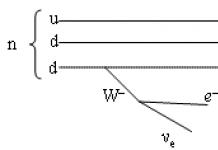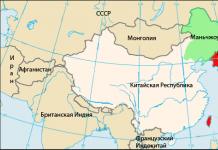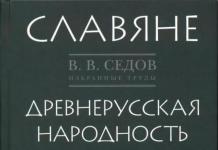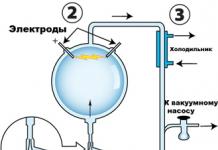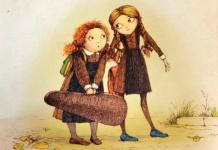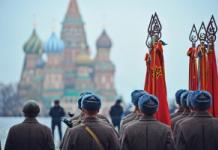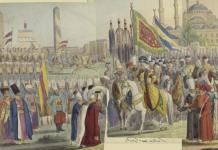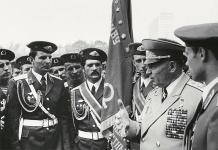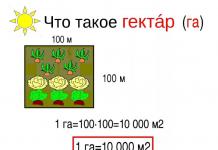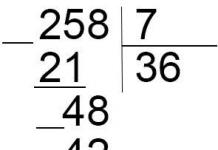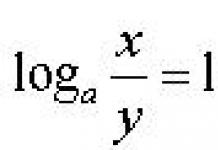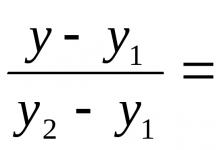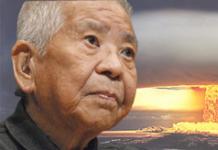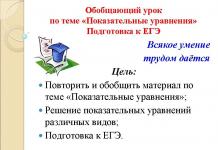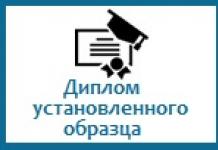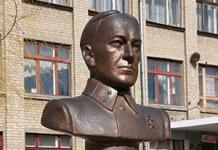Authoritarian style- the style of communication between the teacher and students, when the teacher alone decides all issues related to the life of both the classroom and each student. Based on his own attitudes, he determines the goals of interaction, subjectively evaluates the results of activities.
Author's training programs- curricula, which, taking into account the requirements of the state standard, may contain a different logic for constructing an academic subject, their own points of view regarding the phenomena and processes being studied, if there is a review from scientists in this subject area, teachers, psychologists, methodologists, they are approved by the pedagogical council of the school.
Acmeology- a science that explores the laws and facts of achieving the heights of professionalism, creative longevity of a person.
Analysis- a method of scientific research by decomposing an object into its component parts or mentally dismembering an object by means of logical abstraction.
Basic curriculum of a comprehensive school- the main state normative document, which is an integral part of the state standard in this area of education. It serves as the basis for the development of standard and working curricula and the initial document for funding the school. The basic curriculum as part of the education standard for basic schools is approved by the State Duma, and for complete and secondary schools - by the Ministry of General and Professional Education of the Russian Federation.
Conversation- a question-and-answer method of active interaction between a teacher and students, which is used at all stages of the educational process: to communicate new knowledge, to consolidate, repeat, test and evaluate knowledge.
Intraschool management- purposeful, conscious interaction of the participants in a holistic pedagogical process on the basis of knowledge of its objective laws in order to achieve an optimal result.
Upbringing - specially organized activity of teachers and pupils for the realization of the goals of education in the conditions of the pedagogical process.
Deviant behavior- behavior deviating from the norm.
Deductive methods - logical methods of generalization of empirically obtained data, suggesting the movement of thought from a general judgment to a particular conclusion.
Actions- processes, the motives of which are in the activity in which they are included.
Democratic style- the style of communication between the teacher and students, focused on enhancing the subjective role of the student in interaction, and attracting everyone to the solution of common affairs. For teachers adhering to this style, active positive attitudes towards students, an adequate assessment of their capabilities, successes and failures are characteristic, they are characterized by a deep understanding of the student, the goals and motives of his behavior, the ability to predict the development of his personality.
Activity - internal (mental) and external (physical) human activity, regulated by a conscious goal.
Diagnosis in pedagogy - assessment of the general state of the pedagogical process or its individual components at one time or another of its functioning on the basis of a comprehensive, holistic examination.
Didactics- part of pedagogy, setting out the theoretical foundations of education and training.
Didactic tasks - educational and cognitive management tasks
Didactic material - a system of objects, each of which is intended for use in the learning process as a material or materialized model of a particular system, allocated within the framework of social knowledge and experience, and serves as a means of solving some didactic problem.
Dispute- the method of forming judgments, assessments and beliefs in the process of cognitive and value-orientated activity, does not require definite and final decisions. The dispute perfectly matches the age characteristics of a high school student, whose emerging personality is characterized by a passionate search for the meaning of life, a desire not to take anything on faith, a desire to compare facts in order to establish the truth.
Distance learning Is a form of receiving educational services at a distance without visiting educational institutions using modern information and educational technologies and telecommunication systems such as e-mail, television and the Internet.
Dogmatic learning - a type of collective organization of cognitive activity, widespread in the Middle Ages, it is characterized by teaching in Latin, the main types of student activity were listening and rote memorization.
Additional lessons - one of the forms of organizing educational activities, which is carried out with individual students or a group of students in order to fill gaps in knowledge, develop skills and abilities, and satisfy an increased interest in the subject. In additional classes, teachers practice various types of assistance: clarifying individual questions, attaching weak students to strong ones, re-explaining the topic.
Identification- establishing the identity of an object.
Inductive methods- logical methods of generalization of empirically obtained data, suggesting the movement of thought from particular judgments to a general conclusion.
Induction- logical reasoning, moving from statements of a less general nature to a statement of a more general nature.
Innovation- a purposeful change that introduces new, relatively stable elements into a certain social unit - an organization, a settlement, a society, a group.
Briefing- one of the methods that provides an explanation and demonstration to students of the purpose, tasks and method of performing certain actions, a sequence of operations that make up a particular skill.
Interview- the most flexible method of collecting information, which involves conducting a conversation (according to a specific plan) based on direct, personal contact.
Research method- a way of organizing the search, creative activity of students to solve new problems for them. The teacher presents this or that problem for independent research, knows its result, the course of the solution and those features of creative activity that are required to be shown in the course of the solution.
Combined control- one of the types of control, the essence of which is that several students are called to the board for an answer at once, of which one answers orally, two or more prepare for an answer at the blackboard, some students perform written assignments on the cards, and the rest participate in poll. The advantages of this method are that it enables a thorough examination of several students in a short period of time; it is used when all the material has been mastered and there is a need to test the knowledge of several students at once.
Consultations- one of the forms of organizing educational activities, which is carried out with individual students or a group of students in order to fill gaps in knowledge, develop skills, satisfy increased interest in the subject, but unlike additional classes, they are usually episodic, since they are organized as needed. Distinguish between current, thematic and generalizing (for example, when preparing for exams or tests) consultations.
Laboratory works- an independent group of practice methods that combine hands-on activities with organized student observation. In a school environment, frontal and individual laboratory work is usually carried out. The laboratory experiment ends with the compilation of brief reports containing sketches, diagrams, drawings, tables and theoretical conclusions.
Lecture (at school)- the basic form of the lecture and seminar system adapted to the conditions of the school. School lectures are successfully used in the study of both humanitarian and natural sciences. As a rule, these are introductory and generalizing lectures. In a school environment, a lecture is in many ways close to a story, but much longer in time, it can take up the entire lesson time.
Machine control- a type of programmed control, when students are asked to choose the correct one from several options of possible answers.
Illustration and demonstration method- one of the methods of organizing the activities of schoolchildren, the essence of which lies in the visual presentation (showing) to students of natural objects, phenomena, processes or their layouts, models and images, depending on specific teaching and educational tasks.
Problem statement method- a method of organizing the activities of schoolchildren, the essence of which is that the teacher poses a problem and solves it himself, thereby showing students the way of solving it in its genuine, but accessible to students, contradictions, revealing the train of thought when moving along the path of cognition, while students mentally follow behind the logic of presentation, mastering the stages of solving the problem.
Methodical techniques- the constituent elements (parts, details) of the method, which in relation to the method are of a private subordinate nature, do not have an independent pedagogical task, but are subordinate to the task pursued by this method.
Control methods- the ways by which the effectiveness of educational, cognitive and other types of activity of pupils and the pedagogical work of a teacher is determined.
Teaching methods- ways of professional interaction of the teacher and students with the goal. Solutions for educational tasks.
Methods of pedagogical research- ways of studying pedagogical phenomena, obtaining scientific information about them in order to establish regular connections, relationships and build scientific theories.
Observation- purposeful perception of a pedagogical phenomenon, in the process of which the researcher receives specific factual material.
Punishment- such an impact on the personality of the student, which expresses condemnation of actions and deeds that are contrary to the norms of social behavior, and forces students to unswervingly follow them.
Education- a single process of physical and spiritual formation of the personality, the process of socialization, consciously focused on some ideal images, on historically conditioned, more or less clearly fixed in the public consciousness social standards.
Education as a social phenomenon- a relatively independent system, the functions of which are training and education of members of society, focused on mastering certain knowledge (primarily scientific), ideological and moral values, skills, skills, norms of behavior, the content of which is ultimately determined by the socio-economic and political structure of a given society and the level of its material and technical development.
Education system- a complex of educational institutions.
Education- a specific way of education aimed at personal development by organizing the assimilation of scientific knowledge and methods of activity by students.
Object of pedagogy- the phenomena of reality that determine the development of the human individual in the process of purposeful activity of society.
Explanatory and illustrative method- the method of organizing the activities of schoolchildren, the essence of which is that the teacher communicates ready-made information by various means, and the students perceive, realize and fix this information in their memory. The teacher communicates information with the help of an oral word (story, lecture, explanation), a printed word (textbook, additional manuals), visual aids (pictures, diagrams, films and film strips), a practical demonstration of methods of activity (showing experience, working on a machine, examples of declension, method of solving the problem, etc.).
Operations- processes, the goals of which are in the action of which they are.
Pedagogy- a science that studies the essence, patterns, tendencies and prospects for the development of the pedagogical process (education) as a factor and means of a person's development throughout his life.
Pedagogical activities- a special type of social (professional) activity aimed at realizing the goals of education.
Pedagogical task- this is a materialized situation of education and training (pedagogical situation), characterized by the interaction of teachers and pupils with a specific goal.
Pedagogical system- many interrelated structural components, united by a single educational goal of personality development and functioning in a holistic pedagogical process.
Pedagogical technology- a consistent, interdependent system of teacher's actions associated with the use of a particular set of methods of education and training and carried out in the pedagogical process in order to solve various pedagogical problems: structuring and concretizing the goals of the pedagogical process; transformation of educational content into educational material; analysis of intersubject and intrasubject connections; choice of methods, means and organizational forms of the pedagogical process, etc.
Pedagogical process- specially organized (from a systemic point of view) interaction of teachers and pupils (pedagogical interaction) about the content of education using teaching and upbringing means (pedagogical means) in order to solve educational problems aimed at meeting the needs of both society and the individual in her development and self-development.
Pedagogical experiment- research activities with the aim of studying cause-and-effect relationships in pedagogical phenomena, which involves the experimental modeling of a pedagogical phenomenon and the conditions for its course; active influence of the researcher on the pedagogical phenomenon; measuring the results of pedagogical influence and interaction.
Pedagogical interaction- deliberate contact (long-term or temporary) between the teacher and the pupils, which results in mutual changes in their behavior, activities and relationships.
Written survey- control method, which is carried out as follows: individual students are offered control tasks on cards.
Promotion - a way of expressing a positive public assessment of the behavior and activities of an individual student or group .
Permissive style - the communication style of a teacher who takes a passive position, who has chosen the tactics of non-interference in the creative pedagogical process, is not interested in the problems of both the school and students, evading responsibility for the final, as a rule, negative results in the teaching and upbringing of schoolchildren.
Workshops- one of the forms of organizing educational activities; are used in the study of the disciplines of the natural science cycle, as well as in the process of labor and vocational training; are carried out in laboratories and workshops, in classrooms and at training and experimental sites, etc.
Practical control- a control method used to identify the formation of certain skills and abilities of practical work or formed motor skills. It is used in drawing lessons (in primary grades), labor, physical education, mathematics, physics, chemistry.
Preliminary control- control aimed at identifying knowledge, abilities and skills of students in the subject or section to be studied.
The subject of pedagogy- education as a real holistic pedagogical process, purposefully organized in special social institutions (family, educational and cultural institutions).
Accustoming- the organization of the planned and regular performance of certain actions by children in order to turn them into habitual forms of social behavior.
Working with a book- one of the verbal methods of organizing educational activities. The work with the book is carried out at all stages of training, it is usually combined with the use of other methods, primarily methods of oral presentation of knowledge.
Working curricula- curricula developed taking into account the requirements of the state standard for educational areas, but additionally taking into account the national-regional component, the possibilities of methodological, informational, technical support of the educational process, the level of preparedness of students.
Story- a sequential presentation of predominantly factual material carried out in a descriptive or narrative form. It is widely used in teaching humanitarian subjects, as well as in presenting bibliographic material, characterizing images, describing objects, natural phenomena, and events in public life.
Reproductive methods- methods of organizing the activities of schoolchildren, which involve the reproduction and repetition of the method of activity on the instructions of the teacher.
Self-education- systematic and conscious human activity aimed at self-development and the formation of the basic culture of the individual. Self-education is designed to strengthen and develop the ability to voluntarily fulfill obligations, both personal and basic, based on the requirements of the team, to form moral and volitional qualities, the necessary habits of behavior.
Seminars- one of the forms of organizing educational activities, which is used in the senior grades in the study of humanitarian subjects. The essence of the seminars is a collective discussion of the proposed questions, messages, abstracts, reports prepared by students under the guidance of a teacher.
Synthesis- the method of studying the subject in its integrity, in the unity and interconnection of its parts.
Socialization- the process of assimilation by an individual during his life of social norms and cultural values of the society to which he belongs. It is a difficult, lifelong learning process.
Socio-psychological climate in the team- a system of emotional and psychological states of the team, reflecting the nature of the relationship between its members in the process of joint activities and communication.
Style of pedagogical communication- a stable unity of methods and means of the teacher's and trainees' activities, their subject-subjective interaction.
Lesson structure- the ratio of the elements of the lesson in their certain sequence and the relationship with each other.
Current control- control, which is carried out in daily work in order to check the assimilation of the previous material and identify gaps in the knowledge of students; is carried out primarily with the help of the teacher's systematic observation of the work of the class as a whole and of each student individually at all stages of learning.
Thematic control- control, which is carried out periodically as the passage of a new topic, section and has the goal of systematizing the knowledge of students.
Technology for constructing educational information- the process of making pedagogical decisions in the context of a system of restrictions and prescriptions that are dictated by the established norms (what and to what extent from the given information students should learn), the initial level of preparedness of students for the perception of educational information, the capabilities of the teacher himself, as well as the school in which it works.
Typical curriculum- this curriculum, which is developed on the basis of the state basic curriculum and is approved by the Ministry of General and Professional Education of the Russian Federation and is recommendatory in nature.
Typical training programs- curricula, which are developed on the basis of the requirements of the state educational standard for a particular educational field, are approved by the Ministry of General and Professional Education of the Russian Federation and are recommendatory in nature.
Control- activities aimed at making decisions, organizing, controlling, regulating the control object in accordance with a given goal, analyzing and summing up on the basis of reliable information.
Managerial culture of the head of the school- the measure and method of creative self-realization of the personality of the head of the school in various types of management activities aimed at mastering, transferring and creating values and technologies in school management.
The exercise- systematically organized activity, involving the repeated repetition of any actions in order to form certain skills and abilities or to improve them.
Oral survey- a method of control, which is carried out on an individual basis in order to identify the teacher's knowledge, abilities and skills of individual students. The student is asked to answer a general question, which is subsequently broken down into a number of more specific, clarifying ones.
Oral frontal survey- a method of monitoring the level of knowledge, abilities and skills of students, which requires a series of logically related questions on a small amount of material. With a frontal simultaneous questioning of several students, the teacher expects from them short, laconic answers from the spot.
Training conference- a form of organization of the pedagogical process, which aims to summarize the material on any section of the program and requires a lot of preparatory work (conducting observations, summarizing excursion materials, setting up experiments, studying literary sources, etc.). Conferences can be held in all academic subjects and at the same time go far beyond the curriculum.
Training program- a normative document that reveals the content of knowledge, skills and abilities in the academic subject, the logic of studying the main ideological ideas, indicating the sequence of topics, questions and the general dosage of time for their study.
Educational discussions- one of the verbal methods, a prerequisite for which is the presence of at least two opposite opinions on the issue under discussion. Naturally, in educational discussions that allow students to learn with a certain depth and in accordance with the last word should be for the teacher, although this does not mean that his conclusions are the ultimate truth.
Educational material- a system of ideal models, represented by material or materialized models of didactic material and intended for use in educational activities.
General secondary school curriculum- the curriculum, which is drawn up in compliance with the standards of the basic curriculum. There are two types of school curricula: the school's own curriculum (developed by it on the basis of the state basic curriculum for a long period and reflecting the characteristics of a particular school) and working curriculum (developed taking into account the current conditions and approved by the school's pedagogical council annually).
Subject- a system of scientific knowledge, practical skills and abilities, with their age-related cognitive capabilities, the main starting points of science or aspects of culture, labor, production.
An elective is one of the forms of differentiated education and upbringing, the main task of which is to deepen and expand knowledge, develop the abilities and interests of students. The elective works according to a specific program that does not duplicate the curriculum.
Integrity of the pedagogical process- the synthetic quality of the pedagogical process, which characterizes the highest level of its development, the result of stimulating conscious actions and activities of the subjects functioning in it.
The purpose of modern education- the development of those personality traits that are necessary for her and society to be included in socially valuable activities.
Excursion- a specific teaching and educational lesson, transferred in accordance with a specific educational or educational goal to an enterprise, a museum, an exhibition, in a field, on a farm, etc.
Authoritarian style - the style of communication between a teacher and students, when the teacher alone decides all issues related to the life of both the classroom and each student. Based on his own attitudes, he determines the goals of interaction, subjectively evaluates the results of activities.
Author's training programs- curricula, which, taking into account the requirements of the state standard, may contain a different logic for constructing an academic subject, their own points of view regarding the phenomena and processes being studied, if there is a review from scientists in this subject area, teachers, psychologists, methodologists, they are approved by the pedagogical council of the school.
Acmeology is a science that studies the laws and facts of reaching the heights of professionalism, creative longevity of a person.
Analysis- a method of scientific research by decomposing an object into its component parts or mentally dismembering an object by means of logical abstraction.
Basic curriculum of a comprehensive school- the main state normative document, which is an integral part of the state standard in this area of education. It serves as the basis for the development of standard and working curricula and the initial document for funding the school. The basic curriculum as part of the education standard for basic schools is approved by the State Duma, and for complete and secondary schools - by the Ministry of General and Professional Education of the Russian Federation.
Conversation- a question-and-answer method of active interaction between a teacher and students, which is used at all stages of the educational process: to communicate new knowledge, to consolidate, repeat, test and evaluate knowledge.
Intraschool management- purposeful, conscious interaction of the participants in a holistic pedagogical process on the basis of knowledge of its objective laws in order to achieve an optimal result.
Upbringing - specially organized activity of teachers and pupils for the realization of the goals of education in the conditions of the pedagogical process.
Deviant behavior - behavior that deviates from the norm.
Deductive methods - logical methods of generalization of empirically obtained data, suggesting the movement of thought from a general judgment to a particular conclusion.
Actions- processes, the motives of which are in the activity in which they are included.
Democratic style- the style of communication between the teacher and students, focused on enhancing the subjective role of the student in interaction, and attracting everyone to the solution of common affairs. For teachers adhering to this style, active positive attitudes towards students, an adequate assessment of their capabilities, successes and failures are characteristic, they are characterized by a deep understanding of the student, the goals and motives of his behavior, the ability to predict the development of his personality.
Activity - internal (mental) and external (physical) human activity, regulated by a conscious goal.
Diagnosis in pedagogy - assessment of the general state of the pedagogical process or its individual components at one time or another of its functioning on the basis of a comprehensive, holistic examination.
Didactics is a part of pedagogy that sets out the theoretical foundations of education and training.
Didactic tasks - educational and cognitive management tasks
Didactic material - a system of objects, each of which is intended for use in the learning process as a material or materialized model of a particular system, allocated within the framework of social knowledge and experience, and serves as a means of solving some didactic problem.
Dispute- the method of forming judgments, assessments and beliefs in the process of cognitive and value-orientated activity, does not require definite and final decisions. The dispute perfectly matches the age characteristics of a high school student, whose emerging personality is characterized by a passionate search for the meaning of life, a desire not to take anything on faith, a desire to compare facts in order to establish the truth.
Distance learning is a form of receiving educational services at a distance without visiting educational institutions using modern information and educational technologies and telecommunication systems such as e-mail, television and the Internet.
Dogmatic learning - a type of collective organization of cognitive activity, widespread in the Middle Ages, it is characterized by teaching in Latin, the main types of student activity were listening and rote memorization.
Additional lessons - one of the forms of organizing educational activities, which is carried out with individual students or a group of students in order to fill gaps in knowledge, develop skills and abilities, and satisfy an increased interest in the subject. In additional classes, teachers practice various types of assistance: clarifying individual questions, attaching weak students to strong ones, re-explaining the topic.
Identification- establishing the identity of an object.
Inductive methods- logical methods of generalization of empirically obtained data, suggesting the movement of thought from particular judgments to a general conclusion.
Induction is a logical reasoning moving from statements of a less general nature to a statement of a more general nature.
Innovation- a purposeful change that introduces new, relatively stable elements into a certain social unit - an organization, a settlement, a society, a group.
Briefing- one of the methods that provides an explanation and demonstration to students of the purpose, tasks and method of performing certain actions, a sequence of operations that make up a particular skill.
Interview- the most flexible method of collecting information, which involves conducting a conversation (according to a specific plan) based on direct, personal contact.
Research method- a way of organizing the search, creative activity of students to solve new problems for them. The teacher presents this or that problem for independent research, knows its result, the course of the solution and those features of creative activity that are required to be shown in the course of the solution.
Combined control- one of the types of control, the essence of which is that several students are called to the board for an answer at once, of which one answers orally, two or more prepare for an answer at the blackboard, some students perform written assignments on the cards, and the rest participate in poll. The advantages of this method are that it enables a thorough examination of several students in a short period of time; it is used when all the material has been mastered and there is a need to test the knowledge of several students at once.
Consultations- one of the forms of organizing educational activities, which is carried out with individual students or a group of students in order to fill gaps in knowledge, develop skills, satisfy increased interest in the subject, but unlike additional classes, they are usually episodic, since they are organized as needed. Distinguish between current, thematic and generalizing (for example, when preparing for exams or tests) consultations.
Laboratory works- an independent group of practice methods that combine hands-on activities with organized student observation. In a school environment, frontal and individual laboratory work is usually carried out. The laboratory experiment ends with the compilation of brief reports containing sketches, diagrams, drawings, tables and theoretical conclusions.
Lecture (at school)- the basic form of the lecture and seminar system adapted to the conditions of the school. School lectures are successfully used in the study of both humanitarian and natural sciences. As a rule, these are introductory and generalizing lectures. In a school environment, a lecture is in many ways close to a story, but much longer in time, it can take up the entire lesson time.
Machine control- a type of programmed control, when students are asked to choose the correct one from several options of possible answers.
Illustration and demonstration method- one of the methods of organizing the activities of schoolchildren, the essence of which lies in the visual presentation (showing) to students of natural objects, phenomena, processes or their layouts, models and images, depending on specific teaching and educational tasks.
Problem statement method- a method of organizing the activities of schoolchildren, the essence of which is that the teacher poses a problem and solves it himself, thereby showing students the way of solving it in its genuine, but accessible to students, contradictions, revealing the train of thought when moving along the path of cognition, while students mentally follow behind the logic of presentation, mastering the stages of solving the problem.
Methodical techniques- the constituent elements (parts, details) of the method, which in relation to the method are of a private subordinate nature, do not have an independent pedagogical task, but are subordinate to the task pursued by this method.
Control methods- the ways by which the effectiveness of educational, cognitive and other types of activity of pupils and the pedagogical work of a teacher is determined.
Teaching methods- ways of professional interaction of the teacher and students with the goal. Solutions for educational tasks.
Methods of pedagogical research- ways of studying pedagogical phenomena, obtaining scientific information about them in order to establish regular connections, relationships and build scientific theories.
Observation- purposeful perception of a pedagogical phenomenon, in the process of which the researcher receives specific factual material.
Punishment- such an impact on the personality of the student, which expresses condemnation of actions and deeds that are contrary to the norms of social behavior, and forces students to unswervingly follow them.
Education- a single process of physical and spiritual formation of the personality, the process of socialization, consciously focused on some ideal images, on historically conditioned, more or less clearly fixed in the public consciousness social standards.
Education as a social phenomenon- a relatively independent system, the functions of which are training and education of members of society, focused on mastering certain knowledge (primarily scientific), ideological and moral values, skills, skills, norms of behavior, the content of which is ultimately determined by the socio-economic and political structure of a given society and the level of its material and technical development.
Education system- a complex of educational institutions.
Education- a specific way of education aimed at personal development by organizing the assimilation of scientific knowledge and methods of activity by students.
An object pedagogy are phenomena of reality that determine the development of the human individual in the process of purposeful activity of society.
Explanatory and illustrative method- the method of organizing the activities of schoolchildren, the essence of which is that the teacher communicates ready-made information by various means, and the students perceive, realize and fix this information in their memory. The teacher communicates information with the help of an oral word (story, lecture, explanation), a printed word (textbook, additional manuals), visual aids (pictures, diagrams, films and film strips), a practical demonstration of methods of activity (showing experience, working on a machine, examples of declension, method of solving the problem, etc.).
Operations- processes, the goals of which are in the action of which they are.
Pedagogy- a science that studies the essence, patterns, tendencies and prospects for the development of the pedagogical process (education) as a factor and means of a person's development throughout his life.
Pedagogical activities- a special type of social (professional) activity aimed at realizing the goals of education.
Pedagogical task- this is a materialized situation of education and training (pedagogical situation), characterized by the interaction of teachers and pupils with a specific goal.
Pedagogical system- many interrelated structural components, united by a single educational goal of personality development and functioning in a holistic pedagogical process.
Pedagogical technology- a consistent, interdependent system of actions of the teacher associated with the use of one or another set of methods of education and training and carried out in the pedagogical process in order to solve various pedagogical problems: structuring and concretizing the goals of the pedagogical process; transformation of educational content into educational material; analysis of intersubject and intrasubject connections; choice of methods, means and organizational forms of the pedagogical process, etc.
The pedagogical process is a specially organized (from a systemic point of view) interaction of teachers and pupils (pedagogical interaction) about the content of education using teaching and upbringing means (pedagogical means) in order to solve educational problems aimed at meeting the needs of both society and the individual in its development and self-development.
Pedagogical experiment- research activities with the aim of studying cause-and-effect relationships in pedagogical phenomena, which involves the experimental modeling of a pedagogical phenomenon and the conditions for its course; active influence of the researcher on the pedagogical phenomenon; measuring the results of pedagogical influence and interaction.
Pedagogical interaction- deliberate contact (long-term or temporary) between the teacher and the pupils, which results in mutual changes in their behavior, activities and relationships.
Written survey- control method, which is carried out as follows: individual students are offered control tasks on cards.
Promotion - a way of expressing a positive public assessment of the behavior and activities of an individual student or group .
Permissive style - the communication style of a teacher who takes a passive position, who has chosen the tactics of non-interference in the creative pedagogical process, is not interested in the problems of both the school and students, evading responsibility for the final, as a rule, negative results in the teaching and upbringing of schoolchildren.
Workshops- one of the forms of organizing educational activities; are used in the study of the disciplines of the natural science cycle, as well as in the process of labor and vocational training; are carried out in laboratories and workshops, in classrooms and at training and experimental sites, etc.
Practical control- a control method used to identify the formation of certain skills and abilities of practical work or formed motor skills. It is used in drawing lessons (in primary grades), labor, physical education, mathematics, physics, chemistry.
Preliminary control- control aimed at identifying knowledge, abilities and skills of students in the subject or section to be studied.
The subject of pedagogy- education as a real holistic pedagogical process, purposefully organized in special social institutions (family, educational and cultural institutions).
Accustoming- the organization of the planned and regular performance of certain actions by children in order to turn them into habitual forms of social behavior.
Working with a book- one of the verbal methods of organizing educational activities. The work with the book is carried out at all stages of training, it is usually combined with the use of other methods, primarily methods of oral presentation of knowledge.
Working curricula- curricula developed taking into account the requirements of the state standard for educational areas, but additionally taking into account the national-regional component, the possibilities of methodological, informational, technical support of the educational process, the level of preparedness of students.
Story- a sequential presentation of predominantly factual material carried out in a descriptive or narrative form. It is widely used in teaching humanitarian subjects, as well as in presenting bibliographic material, characterizing images, describing objects, natural phenomena, and events in public life.
Reproductive methods- methods of organizing the activities of schoolchildren, which involve the reproduction and repetition of the method of activity on the instructions of the teacher.
Self-education- systematic and conscious human activity aimed at self-development and the formation of the basic culture of the individual. Self-education is designed to strengthen and develop the ability to voluntarily fulfill obligations, both personal and basic, based on the requirements of the team, to form moral and volitional qualities, the necessary habits of behavior.
Seminars- one of the forms of organizing educational activities, which is used in the senior grades in the study of humanitarian subjects. The essence of the seminars is a collective discussion of the proposed questions, messages, abstracts, reports prepared by students under the guidance of a teacher.
Synthesis- the method of studying the subject in its integrity, in the unity and interconnection of its parts.
Socialization- the process of assimilation by an individual during his life of social norms and cultural values of the society to which he belongs. It is a difficult, lifelong learning process.
Socio-psychological climate in the team- a system of emotional and psychological states of the team, reflecting the nature of the relationship between its members in the process of joint activities and communication.
Style of pedagogical communication- a stable unity of methods and means of the teacher's and trainees' activities, their subject-subjective interaction.
Lesson structure- the ratio of the elements of the lesson in their certain sequence and the relationship with each other.
Current control- control, which is carried out in daily work in order to check the assimilation of the previous material and identify gaps in the knowledge of students; is carried out primarily with the help of the teacher's systematic observation of the work of the class as a whole and of each student individually at all stages of learning.
Thematic control- control, which is carried out periodically as the passage of a new topic, section and has the goal of systematizing the knowledge of students.
Technology for constructing educational information- the process of making pedagogical decisions in the context of a system of restrictions and prescriptions that are dictated by the established norms (what and to what extent from the given information students should learn), the initial level of preparedness of students for the perception of educational information, the capabilities of the teacher himself, as well as the school in which it works.
Typical curriculum- this curriculum, which is developed on the basis of the state basic curriculum and is approved by the Ministry of General and Professional Education of the Russian Federation and is recommendatory in nature.
Typical training programs- curricula, which are developed on the basis of the requirements of the state educational standard for a particular educational field, are approved by the Ministry of General and Professional Education of the Russian Federation and are recommendatory in nature.
Control- activities aimed at making decisions, organizing, controlling, regulating the control object in accordance with a given goal, analyzing and summing up on the basis of reliable information.
Managerial culture of the head of the school- the measure and method of creative self-realization of the personality of the head of the school in various types of management activities aimed at mastering, transferring and creating values and technologies in school management.
The exercise- systematically organized activity, involving the repeated repetition of any actions in order to form certain skills and abilities or to improve them.
Oral survey- a method of control, which is carried out on an individual basis in order to identify the teacher's knowledge, abilities and skills of individual students. The student is asked to answer a general question, which is subsequently broken down into a number of more specific, clarifying ones.
Oral frontal survey- a method of monitoring the level of knowledge, abilities and skills of students, which requires a series of logically related questions on a small amount of material. With a frontal simultaneous questioning of several students, the teacher expects from them short, laconic answers from the spot.
Training conference- a form of organization of the pedagogical process, which aims to summarize the material on any section of the program and requires a lot of preparatory work (conducting observations, summarizing excursion materials, setting up experiments, studying literary sources, etc.). Conferences can be held in all academic subjects and at the same time go far beyond the curriculum.
Training program- a normative document that reveals the content of knowledge, skills and abilities in the academic subject, the logic of studying the main ideological ideas, indicating the sequence of topics, questions and the general dosage of time for their study.
Educational discussions- one of the verbal methods, a prerequisite for which is the presence of at least two opposite opinions on the issue under discussion. Naturally, in educational discussions that allow students to learn with a certain depth and in accordance with the last word should be for the teacher, although this does not mean that his conclusions are the ultimate truth.
Educational material- a system of ideal models, represented by material or materialized models of didactic material and intended for use in educational activities.
General secondary school curriculum- the curriculum, which is drawn up in compliance with the standards of the basic curriculum. There are two types of school curricula: the school's own curriculum (developed by it on the basis of the state basic curriculum for a long period and reflecting the characteristics of a particular school) and working curriculum (developed taking into account the current conditions and approved by the school's pedagogical council annually).
Subject- a system of scientific knowledge, practical skills and abilities, with their age-related cognitive capabilities, the main starting points of science or aspects of culture, labor, production.
An elective is one of the forms of differentiated education and upbringing, the main task of which is to deepen and expand knowledge, develop the abilities and interests of students. The elective works according to a specific program that does not duplicate the curriculum.
Integrity of the pedagogical process- the synthetic quality of the pedagogical process, which characterizes the highest level of its development, the result of stimulating conscious actions and activities of the subjects functioning in it.
The purpose of modern education- the development of those personality traits that are necessary for her and society to be included in socially valuable activities.
Excursion- a specific teaching and educational lesson, transferred in accordance with a specific educational or educational goal to an enterprise, a museum, an exhibition, in a field, on a farm, etc.
... Parental authority(from Latin auctoritas - power, strength) - the distinctive features of an individual or group, thanks to which they are trustworthy and can have a positive impact on the views and behavior of other people; the influence of parents on the beliefs and behavior of children, based on deep respect and love for parents, trust in the high importance of their personal qualities and life experience, words and deeds, is also recognized.
... Adaptation(from the Latin adaptatio (adapto) - I adapt) - the body's ability to adapt to various environmental conditions.
accreditation I (from fr accreditation (accredo) - I trust) - in the field of education - the procedure for determining the status of a higher educational institution, confirmation of its ability to train specialists at the level where there are rzhavnyh requirements in a certain direction (specialty).
... Acceleration(from Latin acceleratio - acceleration) - acceleration of the physical development of children, in particular height, weight, earlier puberty.
... Asset ( from Latin activus - active, efficient) - a group of pupils, members of a specific team, who are aware of the requirements of the team leader, help him in organizing the life of the pupils, and show a certain initiative.
... Activity(in study) - a characteristic of the peculiarities of the cognitive activity of the individual, consists in the conscious use of her intensive methods, means, forms of mastering knowledge, developing skills, and at will.
... Andragogy(from gr androa - an adult and agogge - management) - a branch of pedagogy dealing with the problems of education, training and upbringing of adults.
... Abnormal children(from gr anomalia (anomalos) - wrong) - pupils who have significant deviations from the norms of physical or psychological development and require education and training in special educational institutions with mortgages.
... Asceticism(from gr asketes - ascetic) - an extreme level of moderation, restraint, rejection of life's material and spiritual benefits, voluntary transfer of physical torment, difficulties
... Postgraduate studies(from Latin aspirans - one who strives for something) - a form of training scientific, pedagogical and scientific personnel
... Audiovisual teaching aids(from Latin audire - to listen and visualis - visual) - one of the means of educational learning technologies using the developed audiovisual teaching materials
... Ball(from fr balle - ball, ball) - the result of assessing the educational activities of students in a conditionally formal reflection and numerical measurement.
... Didactic conversation- a teaching method that provides for the use of the previous experience of students in a certain area of knowledge and, on the basis of this, engaging them through dialogue to understand new phenomena, concepts or reproduction already acquired.
... Types of education- general, polytechnic, professional. Types of human development - biological (physical), mental, social.
... Types of communication- verbal, manual (from Latin manualis-manual), technical, material, bioenergetic.
... Problem statement-Creation of a problem situation by the teacher, helping students in identifying and "accepting" a problematic task, using verbal methods to activate the students' mental activity, aimed at increasing the cognitive interest of interests.
... Requirement- the method of pedagogical influence on the consciousness of the pupil in order to cause, stimulate or slow down certain types of his activities. Types of demands: demand-request, demand-trust, demand-approval, demand-advice, demand-hint, conditional demand, demand in game design, demand-condemnation, demand-distrust, demand-threat.
... Education is all-round- upbringing, which involves the formation of certain qualities in a person in accordance with the requirements of mental, moral, labor, physical and aesthetic education.
... Harmonious upbringing- education, which provides that the quality of the components of education (mental, moral, labor, physical, aesthetic) complement each other, mutually enrich.
... Environmental education(from gr oikos - house, environment and logos - teaching) - the acquisition of knowledge in the field of ecology by a person and the formation of her moral responsibility for the preservation of the natural environment and reasonable coexistence with it.
... Economic education- education, provides for the solution of the following tasks: the formation of economic thinking, mastering economic knowledge, skills and abilities of economic relations.
... Aesthetic education- the development of a person's feelings of beauty, the formation of skills and abilities to create beauty in the surrounding reality, to be able to distinguish the beautiful from the ugly, to live according to the laws of spiritual beauty.
... Moral education- education, involves mastering the norms and rules of moral behavior, the formation of feelings and beliefs, skills and abilities.
... Legal education- the formation of a high legal culture among citizens, presupposes a conscious attitude of the individual to his rights and duties, respect for the laws and rules of human life, readiness to comply and conscientiously fulfill certain requirements that express the will and interests of the people.
... Physical education- upbringing, aims to create optimal conditions for ensuring sufficient physical development of the individual, maintaining his health, mastering knowledge about the characteristics of the human body, physiological processes occurring in it, acquiring sanitary and hygienic skills and taking care of one's own body, maintaining and developing it potencies.
... National education- is historically determined and created by the ethnos a system of educational ideals, views, beliefs, traditions, customs aimed at the expedient organization of the activities of members of society, in the process of which the process of mastering the moral and spiritual values of the people takes place, the connection and continuity of generations, the conciliarity of the people is ensured.
... Sexual education- mastering by the younger generation of ethics and culture in the sphere of gender relations, the formation of his needs to be guided by the norms of morality in relations between persons of the opposite sex.
... Gene(from gr genos - genus, origin, hereditary) - an elementary unit of heredity, bearer of inclinations.
... Hygiene of teaching and educational work- a system of scientifically based rules for organizing the educational process, taking into account the necessary sanitary requirements.
... Dignity national- an ethical category that characterizes a person from the point of view of expanding the concept of spiritual values beyond his "I" and a combination of personal experiences, sensations with national values.
... Humanization of education- creating optimal conditions for the intellectual and social development of each pupil, revealing deep respect for a person, recognizing the natural right of the individual to freedom, social protection, developing abilities and manifesting individuality, self-realization of physical, mental and social potentials, to create a socio-psychological filter against the destructive effects of negative factors of the natural and social environment, fostering feelings of humanism, mercy, charity among young people.
... Humanism(from Latin humanus - human, humane) - a progressive direction of spiritual culture, exalts a person as the greatest value in the world, asserts the human right to earthly happiness, protection of the rights to freedom, all-round development and manifestation of their abilities.
... Dalton plan- the form of organization of training, which provided for the following technology: the content of the educational material for each discipline was divided into parts (blocks), each student received individual tasks in the form of a plan, independently worked on its implementation, reported on the work, gaining a certain number of points, and then received the next task. In this case, the teacher was assigned the role of organizer, consultant. Students were transferred from class to class not after the end of the school year, but depending on the degree of mastery of the program material (P-4 times a year).
... Democratizing education- the principles of organizing the educational system, providing for decentralization, autonomization of educational institutions, ensuring cooperation between educators and pupils, taking into account the opinion of the collective and each individual person, defining a person as the highest natural and social value, the formation of a free creative personality.
D demonstration- a teaching method that provides for the demonstration of objects and processes in their natural form, dynamics.
... State education standard- a set of uniform norms and requirements for the level of educational attainment in certain educational institutions.
... Deviant behavior- (from Lat deviatio - deviation) - deviation from the established norms of morality and law.
... Deduktsi I (from Latin deductio - deduction) - a transition from general concepts about a certain type of subject to a private, partial knowledge.
... Definition(from Latin definitio - definition) - a short, logically motivated definition that reveals significant differences or features of a concept.
... Didactics(from gr didaktikos - I teach) - a branch of pedagogy that develops the theory of education and training.
... Discussion(from Latin discussio - consideration, research) - a teaching method aimed at intensifying and effective educational process through the vigorous activity of pupils (students) in search of scientific truth in.
... Dispute- a technique (by the method of persuasion) the formation of beliefs and conscious behavior through disputes, discussions in the process of verbal communication with members of the primary collective or other group.
... Thesis(from lat dissertatio-research) -scientific work carried out with the aim of its public protection to obtain a degree.
... Discipline(from Latin disciplina - teaching, upbringing, routine) - a certain order of people's behavior, ensures the consistency of actions in social relations, the obligatory assimilation and implementation of the rules by the individual.
... Psychological and pedagogical diagnostics(from gr diagnostikos - capable of recognizing) is a branch of psychology and pedagogy that develops methods for identifying individual characteristics and prospects for the development and education of a personality.
... Dogmatism(from gr dogma - teaching that is taken as an immutable truth) - a way of assimilating and applying knowledge, in which a particular teaching or position is perceived as a complete, eternal truth, the rule is applied without taking into account the specific conditions of life.
... Home study work- a form of organization of training, which provides for the independent fulfillment of educational tasks by pupils (students) in extracurricular time (directly at home, in extended day groups, etc.) -
... Assistant professor(from Latin docens - the one that teaches) - the academic title of a teacher of a higher educational institution.
... Externship(from Latin externus - external, outsider) - a form of education based on independent mastery of academic disciplines in accordance with the professional educational program in the chosen specialty.
... Elitist(from fr elite - the best, selective (lat eligo - I choose) - an educational institution that is distinguished by its influence, privileged position and prestige, high level of education.
... Aesthetics(from gr aistesis - sensation, feeling) - the science of the beautiful and its role in human life, the general laws of artistic knowledge of reality, the development of art.
... Ethics(from gr ethisa - habit, disposition) - a science that studies morality as a form of social consciousness, its essence, historical development.
ethnicization upbringing (from gr ethos - people) - saturation of upbringing with national content, aimed at the formation of national consciousness and national dignity of the individual, the formation of the features of the national mentality, instilling in young people a sense of social responsibility for the preservation, augmentation and life of ethnic culture.
... Ethnopedagogy- a science that studies the features of the development and formation of folk pedagogy.
... The task of education- ensuring the comprehensive harmonious development of the individual.
... Makings- genetically determined anatomical and physiological features of the brain and nervous system, which are individually natural prerequisites for the development and formation of personality.
... Educational institutions- educational institutions that provide education and upbringing of the younger generation.
... Out-of-school establishments- children's educational institutions, whose activities are aimed at meeting human needs in meeting interests and inclinations, obtaining additional knowledge, skills and abilities by schoolchildren, developing intellectual potencies, promoting future professional choice of a person. This group of institutions includes palaces and houses of children's and youth creativity, stations for young technicians, naturalists, sports, art, music schools, children's libraries, theaters, cinemas, children's iron shops.
... Habit- a way of behavior, the implementation of which in a certain situation acquires the character of internal needs for the individual.
... Regularities of the educational process- factors reflecting a necessary, essential, stable, repetitive, common for a particular industry, the relationship between the phenomena of objective reality.
... Patterns of learning- factors that express the most necessary, essential, important, general for the organization of training.
... Encouragement- the method of upbringing, which provides for a pedagogical influence on the personality and expresses a positive assessment by the educator of the student's behavior in order to consolidate positive qualities and stimulate active activity.
... Educational tools- the property of material and spiritual culture (fiction and scientific literature, music, theater, radio, television, works of art, the surrounding nature, etc.), forms and types of educational work (fees, conversations, conferences, games, etc.), which are used in the course of action of a particular method.
... Means of education- items of school equipment used in the process of teaching and educational work (books, notebooks, tables, laboratory equipment, writing materials, etc.,).
... Healthy lifestyle- human life activity, taking into account the characteristics and capabilities of his body, providing socio-economic and biological conditions for its development and preservation.
... Knowledge- the ideal expression in symbolic form of the objective properties and connections of the natural and human world; the result of the reflection of the surrounding reality.
... Ideal(from gr idea - idea, idea) - the concept of moral consciousness and the category of ethics, containing the highest moral requirements, the implementation of which would personally allow her to acquire perfection; an image of aybilsh valuable and majestic in people.
... Image(from the English image - image, image) - the impression that a person makes on others, the style of his behavior, appearance, her manner. ...
... Illustration(from Latin illustratio - illuminate, explain) is a teaching method that involves showing objects and processes in their symbolic representation (photos, drawings, diagrams, etc.)).
... Improvisation(from Latin improvisus - unpredictable, sudden) - the activity of a person, a teacher-educator, is carried out in the process of pedagogical communication without preliminary preparation, understanding.
... Individuality(from Latin individuum - indivisible) - a person "personality, which is distinguished by a set of traits, qualities, uniqueness of the psyche, behavior and activities, which emphasize its originality, uniqueness.
... Induction(from Latin inductio - deduction) - a research method, training associated with the movement of thought from the singular to the general.
... Briefing(from lat instructio - guidance) - "a teaching method that provides for the disclosure of norms of behavior, the peculiarities of using methods and teaching aids, compliance with safety measures on the eve of being involved in the process of performing educational operations.
... Intensification of the educational process(from fr intensification (intensio) - tension) - activation of the mental capabilities of the individual to achieve the desired results
... Internationalism(from Latin inter - between and natio - people) - a moral concept that denotes respectful attitude towards other peoples, their history, culture, language, the desire for mutual assistance.
... Infantilism(from Latin infantilis - for children) - a delay in the development of the body, manifested in the preservation of physical and mental traits in an adult inherent in childhood.
... Categories of didactics(from gr Kategoria - statement, main and general feature) - general concepts that reflect the most essential properties and relationships of objects, phenomena of the objective world; category, a group of objects, phenomena, united by the commonality of certain signs.
... Department(from gr kathedra - seat, chair): 1) a place for a teacher, speaking, 2) in higher educational institutions - the main educational and scientific unit that carries out educational, methodological and research work with one or more related disciplines.
... Method classification- classification, providing for the grouping of teaching methods depending on the sources of information, logic of thinking, the level of independence in the process of cognition.
... Classroom teacher- a teacher who directly supervises the primary student collective.
... Cloning(from gr klon - sprout, shoot) - a method of growing biological organisms from one cell using cell culture.
... Team- a socially significant group of people united by a common goal, act in concert to achieve this goal and have self-governing bodies.
... Curriculum component(school) - a list of academic disciplines that can be included in the working curriculum by decision of the school council (gymnasium, lyceum).
... Pedagogical council(from Latin consilium - meeting, meeting) - a meeting of teachers, educators and psychologists to find out the reasons for various systematic deviations in the behavior of the pet and the definition of scientifically based western virgins of his re-education.
synopsis t (from Latin conspectus - review) - a short written presentation of the content of a book, article, oral presentation.
... Parenting concepts(from lat conceptio - a set, a system) - a system of views on certain phenomena, processes, a way of understanding, interpreting pedagogical phenomena; the basic idea of the theory of the content and organization of human upbringing.
... The culture(from lat kultura - upbringing, education, development) - a set of practical, material and spiritual achievements of society throughout its history.
... Kurata p (from Latin curator, from curare - to care, to worry): 1) a guardian, a guardian, 2) a person who is entrusted with general supervision of some work, 3) a person who oversees the educational process in a student group ...
... Lecture(from Latin lectio - reading) is a teaching method that involves using the previous experience of students in a certain area of knowledge and, on the basis of this, attracting them through dialogue to the awareness of new phenomena, concepts, or reproduction of those already acquired.
... Leader(from the English leader - the one who leads, manages) - a member of the team, in important situations, is able to exert a noticeable influence on the behavior of other team members, take initiative in actions, take responsibility for the activities of the team, lead it behind him.
... Licensing(from Latin licentia - right, permission) - a procedure for determining the ability of an educational institution of a certain type to conduct educational activities related to obtaining higher education and qualifications in accordance with the requirements of higher education standards, as well as state requirements regarding personnel, scientific-methodological and material technical support.
... License- special permission received from government agencies for various types of activities, including educational.
... The logic of the educational process-optimally effective way of movement of human cognitive activity from the initial level of knowledge, abilities, skills and development to the required level of knowledge, skills, skills and development. It includes a number of components: awareness and understanding of educational tasks; independent activities aimed at mastering knowledge, defining laws and rules; developing skills and abilities to apply knowledge in practice; analysis and assessment of students' learning activities
... Speech therapy(from gr logos - word and paideia - education, training) - a science that studies speech disorders and deals with the correction of speech defects
... Person- a biological creature of the homo sapiens type (thinking man), which is characterized by physiological and biological characteristics: a straight gait, developed cranium, forelimbs, etc.
... master(from Latin magister - chief, teacher) - an academic degree awarded in higher educational institutions.
... Master's degree(from Latin magistratus - dignitary, chief) - a governing body in higher educational institutions that train masters.
... Pedagogical skill- perfect creative fulfillment by the teacher-educator of professional functions at the level of art, the result of which is the creation of optimal socio-psychological conditions for the formation of the personality of the pupil, ensuring a high level of intellectual and moral-spiritual development.
... Mentality(from it Mentalitnet, from Latin mentis - a way of thinking, mental disposition, soul, mind, thinking) - perception of the world, attitude, vision of oneself in the world, peculiarities of manifestation of national character, their own character Dniester, attitude to the surrounding myrtle.
... The purpose of education- perfect prediction of the final results of education.
... Parenting methods(from gr methodos - way, way) ways of influence of the educator on the consciousness, will and behavior of the pupil in order to form his stable beliefs and certain norms of behavior.
... Research methods- methods, techniques and procedures for empirical and theoretical knowledge of the phenomena and processes of pedagogical reality.
... Teaching methods- orderly ways of activities of teachers and students, aimed at the effective solution of teaching and educational problems.
... youth subculture- the culture of a certain generation of young people, which differs in a common lifestyle, behavior, group norms, values and interests.
... Monitoring(from English monitoring, from Latin monitor - one who looks after, observes) - 1) observation, assessment and forecast of the state of the environment in connection with human economic activity, 2) collection of information by means of mass communication 3) observation of educational and educational processes in order to identify their compliance with the desired result or previous assumptions.
... Moral b (from Latin moralis - moral, from moris - custom) - one of the forms of social consciousness, a system of views and ideas, norms and assessments that regulate the behavior of people.
... Motives of teaching(from fr motif, from lat moveo - I move) - internal psychic forces (motors) that stimulate human cognitive activity. Types of motives: social, incentive, cognitive, professional value, flax mercantile.
... Possession- application of knowledge in practice, carried out at the level of automated actions through multiple repetitions.
... Suggestion- various means of verbal and non-verbal emotional impact on a person in order to introduce her to a certain state or induce certain actions.
... Modular training(from lat modulus - measure) - the organization of the educational process, which is aimed at mastering a holistic block of adapted information and provides optimal conditions for social and personal growth of the participants in its pedagogical process.
... Problem learning- teaching, which differs in that the teacher creates a certain cognitive situation, helps students to highlight the problematic task, understand it and "accept"; organizes students for independent mastering of a new volume of knowledge necessary for solving problems; offers a wide range of using the acquired knowledge in practice and practice.
... Distance learning- modern educational technology using means of transmitting educational and methodological information at a distance (telephones, television, computers, satellite communications, etc.)).
... Oligophrenopedagogy(from gr oligos - small and phren - mind and pedagogy) - a branch of pedagogical science, which is engaged in the education and training of mentally retarded people.
... Optimization of the learning process(from Latin optimus - the best, the most) - the process of creating the most favorable conditions (selection of methods, teaching aids, ensuring sanitary and hygienic conditions, emotional factors, etc.) for the received. Annie the desired results without the additional investment of time and physical effort.
... Higher education- the education system, which provides for the provision of fundamental, general cultural, practical training of specialists who should determine the pace and level of the scientific, technical, economic and socio-cultural process, the formation of the intellectual potential of societies.
... Preschool education- the initial structural component of the education system, which ensures the development and upbringing of children in the family and preschool educational institutions (nurseries, kindergartens).
... Extracurricular education- components of the education system aimed at meeting human needs in satisfying interests and inclinations, children gaining additional knowledge, skills and abilities, and the development of intellectual potential.
... Polytechnic education(from gr poly - a lot and techne - art, craftsmanship, dexterity) - one of the types of education, the tasks of which are familiarization with various industries, knowledge of the essence of many technological processes, mastering certain skills and habits of servicing simple technological processes.
... Professional education- education, aimed at mastering the knowledge, skills and abilities necessary to fulfill the tasks of professional activity.
... Vocational education- education, ensures that citizens receive a certain profession in accordance with their vocation, interests and abilities, social preparation for participation in productive work.
... General secondary education- the leading component of the education system, providing education and upbringing of children under 18 years of age, preparing them for vocational education and work.
... Education-media- direction in pedagogy, providing for the study by schoolchildren (students) of the laws of mass communications (press, television, radio, cinema, etc.)).
... Education- a measure of an individual's cognitive activity, which manifests itself in the level of knowledge gained that can be used in practice.
personality b - socio-psychological concept; a person, characterized from a socio-psychological point of view, primarily by the level of development of the psyche, the ability to assimilate social experience, the ability to split with other people.
... Educational and qualification characteristics- a set of basic requirements for the professional qualities, knowledge and skills of a specialist necessary for the successful performance of his professional functions.
... Orthodox(from gr orthodoxos - orthodox) - a person who steadily adheres to a certain teaching, doctrine, system of views.
... Memory- the body's ability to store and reproduce information about the external world and about its internal state for its further use in the process of life.
... Paradigm(from gr paradeigma - example, sample) - recognition of scientific achievements that, over a period of time, have provided the community with models for posing a problem and solving them.
... Pedagogy(from gr paidec - children; ano - leading) - the science of teaching, education and upbringing of people in accordance with the needs of the socio-economic development of society.
... Waldorf pedagogy- a set of methods and techniques of education and training, based on anthroposophical (anthroposophy is a religious-mystical teaching, puts in place. God a deified person) interpretation of human development as an integral interaction of bodily, mental and spiritual factors.
... Folk pedagogy- a branch of empirical pedagogical knowledge and folk experience, reflecting views on the system, directions, forms, means of education and training of the younger generation.
... Pedology(from gr pais - child and logos - teaching) - the science of the child, especially its anatomical, physiological, mental and social development.
... Pedocentrism(from gr pais (pados) - child, lat centrum - center) is one of the directions of pedagogy, which claims that the content, organization and methods of teaching are determined by the immediate interests and problems of children.
... Re-education- a system of educational influences of a teacher on a pupil with the aim of inhibiting negative manifestations in behavior and asserting positive qualities in activity.
... Belief- the rational moral basis of the individual's activity, allows her to carry out a certain act consciously; the basic moral attitude, which determines the purpose and direction of a person's actions, a firm belief in something, for some reason, based on a certain idea, a worldview.
... Perspective- the goal, "tomorrow's joy" (AC. Makarenko), which acts as a stimulus in the activities of the collective and its individual members of its members.
... Textbook- an educational book, which reveals the content of educational material for a particular discipline in accordance with the requirements of the current program.
... A comprehensive approach to parenting- an approach to education, which presupposes the unity of goals, objectives and means of achieving it through the activities of various social institutions (families, educational institutions, the media).
... Study plan- a normative document that defines for each type of general education educational institutions a list of academic subjects, the order of their study by year, the number of hours per week allocated for their study, the schedule of the educational process.
... Extracurricular educational work- educational measures, which are carried out in general educational educational institutions under the guidance of teachers-educators.
... Extracurricular work- various types of independent educational work of students within the framework of the training and education system (home study work, excursions, circle work, etc.)).
... Instructional guide- an educational book, which discloses the content of the educational material, which does not always meet the requirements of the current program, but goes beyond its limits, additional tasks are identified, aimed at expanding the cognitive interests of students, the development of their independent cognitive activity.
... Accustoming- organization of the planned and regular implementation of certain actions by pupils with elements of coercion, compulsion in order to form stable behavioral habits.
... Reception education- Composite method, defines the way to implement its requirements.
... Admission training- a composite of the method, certain one-time actions aimed at the implementation of its requirements.
... Example- a method of education, which provides for the organization of a role model in order to optimize the process of social inheritance.
... Parenting principles(from lat rginisirium - base, beginning) - the initial provisions, which are the foundation of the content, forms, methods, means and techniques of the educational process.
... Principles of education(from lat rgincyrium - base, beginning) - the initial provisions laid down as the basis for the activities of the entire education system of Ukraine and its structural subdivisions
... Management principles- the initial provisions that determine the main directions, forms, means and methods of management of general educational institutions.
pedagogical prognostics(from gr prognostike - the art of making a forecast) - the field of scientific knowledge, examines the principles, patterns and methods of forecasting on the objects that pedagogy studies.
... Educational program- a normative document that describes the content of the educational material with the definition of sections, topics, the approximate number of hours to study them.
... Professiogram- a description of the requirements, socio-psychological and physical personal qualities that a certain profession puts forward ... Profession(from Latin professio - officially indicated occupation) - a type of work activity that requires certain knowledge and work skills and is a source of existence, life activity.
... Psychotechnics- a direction in psychology, develops the issues of applying knowledge about the mental activity of a person in the process of solving practical problems of educating a person's personality.
... Rada of a general educational educational institution- an association of employees of a general education institution, students, parents and the public, which acts in the period between the general meeting (conference) to address social, organizational and economic issues in the life of a general education educational institution.
... I'm glad pedagogical- unification of teachers of an educational institution in order to consider issues of organizing and improving the educational process.
... Rating(from the English rating - rating, class, category) - an individual numerical indicator in the education system, an assessment of success, achievements, knowledge at a particular moment of an individual in a certain field, discipline, allows you to determine the level of such achievements or the quality of knowledge in other aspects.
retardation(from Latin retardatio - delay, slowdown) - developmental lag in children.
... abstract(from lat refeire - to report, to report) - a summary of the content of the book read, scientific work, a message on the results of the studied scientific problem.
... Education levels- the gradualness of obtaining general education and vocational training through the passage of certain stages: primary education, basic general education, complete secondary education, vocational education, basic and higher education, higher.
... Physical development- the growth of a biological organism as a result of cell division.
... The driving force behind development- the result of contradictions between biological, physical and mental needs and the existing level of physical, mental and social development of the individual.
... The driving force of the educational process- the result of contradictions between socio-mental and physiological needs and the existing level of upbringing of the individual.
... The driving force behind the learning process- the result of contradictions between cognitive and practical tasks, on the one hand, and on the other, the available level of knowledge, skills and abilities, on the other.
... Self-education- systematized and purposeful activity of an individual, aimed at the formation and improvement of its positive qualities and overcoming negative ones.
... Synthesis- a method that provides for a mental or practical combination of the elements or properties of an object identified by the analysis, a phenomenon into one whole.
... Education system- a set of educational institutions, scientific, scientific, methodological and methodological institutions, research and production enterprises, state and local education authorities and self-government in the field of education.
... Scout(from the English scout - scout) - one of the systems of out-of-school education, which is the basis of the activities of children's and youth scout organizations. It arose at the beginning of the XX century. Scout organizations for boys (for scouts) and for girls (girls scouts) operate separately.
... Family- a socio-psychological association of close relatives (parents, children, grandmothers, grandfathers) who live together and provide biological, social and economic conditions for procreation.
... Aesthetic tastes- a stable, emotional and evaluative attitude of a person to the beautiful, which is selective, subjective.
... Heredity- the ability of biological organisms to transmit certain inclinations to their offspring.
... Speciality- necessary for society, the scope of application of the physical and spiritual forces of a person is limited, which gives it the opportunity to receive the necessary means for life, a complex of knowledge and practical skills acquired by a person for engaging in a certain type of activity.
... Pedagogical communication- the system of organic socio-psychological impact of the teacher-educator and pupil in all spheres of activity, has certain pedagogical functions, is aimed at creating optimal socio-psychological conditions for an active and effective life of the individual.
... Observation- a teaching method that provides for the perception of certain objects, phenomena, processes in the natural and industrial environment without outside interference in these phenomena and processes.
... Collective and creative affairs- the form of extracurricular educational activities, in the preparation and conduct of which all members of the children's team take part, and each student has the opportunity to identify and develop their interests and capabilities.
... Stages of development of the team- an expression of the inner dialectic of its formation, which is based on the level of relationships between the educator and pupils, between members of the team.
... Democratic style(from gr demokratia - power of the people, democracy) - taking into account the opinion and freedom of the collective in organizing the life of the pupils.
... Liberal style(from Latin liberalis - free) - unprincipled indifference to the negative influences of pupils, connivance to pupils.
... Process structure skill- a number of interrelated and interdependent components: perception (direct, mediated), understanding (awareness, comprehension, enlightenment), memorization, generalization and systematization, comprehension, effective practice as an impetus to knowledge and the criterion of the truth of the knowledge gained.
... The structure of the upbringing process- logically interconnected components that ensure the process of personality formation: mastering the rules and norms of behavior, the formation of feelings and beliefs, the development of skills and habits in behavior, these, practical activities in social environments.
... Deaf pedagogy(from Latin surdus - deaf and pedagogy) - a branch of pedagogy (in particular defectology), dealing with the problems of development, training and education of children with hearing impairments.
... Pedagogical tact(from Latin tactus - touch, sensation) - a sense of proportion, a sense of the specific state of the pet, which prompts the educator a delicate way of behavior in communicating with students in various fields of activity; IUI inn to choose the most appropriate approach to the personality in the system of educational relations with her.
... Talent(from gr talanton - weight, measure) - a set of abilities that allow you to get a product of activity that is distinguished by novelty, high perfection and social significance.
... Tests(from the English test - test, research) - a system of formalized tasks to identify the level of preparedness of pupils (students), mastering this knowledge, skills, and abilities.
... Pedagogical technique(from gr technike - skillful, experienced) - a set of rational means and behavioral features of the teacher-educator, aimed at the effective implementation of the chosen methods and techniques of teaching and educational work with an individual student or the whole class team in accordance with the goal of the educator and specific objective and subjective prerequisites (skills in the field of speech culture; possession with your body, facial expressions, pantomime, gestures, the ability to dress, to monitor your appearance, compliance with the pace and rhythm of work, the ability to communicate; possession of psychotechnics).
... Type of training- the method and features of the organization of human mental activity. In the history of schooling, the following types of teaching were distinguished: dogmatic, explanatory-illustrative, problematic.
... Type of teaching dogmatic- type, which is characterized by the following features: the teacher communicates to the students a certain amount of knowledge in a finished form without explanation; pupils memorize them without realizing and understanding, and memorize them almost literally.
... Type of training explanatory and illustrative- this type, which consists in the fact that the teacher informs students of a certain amount of knowledge, explains the essence of phenomena, processes, laws, rules, etc., using illustrative material; students have knowledge to assimilate the proposed share of knowledge and reproduce at the level of deep understanding; be able to apply knowledge in practice.
... Typhlopedagogy(from gr typhlos - blind and pedagogy) - a branch of pedagogy (in particular defectology) about the peculiarities of upbringing and teaching children with visual impairments.
... Skill- the ability of a person to consciously perform a certain action based on knowledge, readiness to apply knowledge in practical activities based on consciousness.
... Persuasion- one of the techniques of the persuasion method, aimed at preventing the pupil's deliberate actions in order to inhibit them, taking into account the individual characteristics of his socio-psychological development.
... Lesson- a form of organization of training, according to which the teacher conducts classes in a classroom with a constant composition of students who have approximately the same level of physical and mental development, according to the established schedule and regulations.
... Biological inheritance- the process of receiving by future generations from biological parents due to the gene-chromosomal structure of certain inclinations.
... Social inheritance- the process of assimilation by a child of the social and psychological experience of parents and the environment (languages, habits, behavioral characteristics, moral and ethical qualities, etc.)).
A teacher is a specialist with special training and carries out training and education of the younger generation.
... Parenting factors(from Lat Factor - what it does) - objective and subjective factors that affect the definition of the content, directions, means, methods, forms of upbringing.
... Fetish(from fr fetiche - amulet, magic): 1) an inanimate object, which, according to believers, is endowed with supernatural magical powers and serves as an object of religious worship, 2) an object of blind worship.
... Forms of education(from Latin forma - appearance, device) - clearly expressed in time and space, the organization of educational activities of students associated with the activities of the teacher ::
bell lancaster- a form of organization of training, which consists in the fact that one teacher supervised the educational activities of a large group of students (200-250 people), involving older students (monitors) in this work, the teacher first taught the monitors, and then they taught their comrades in small groups ("mutual learning") nya ");
brigade laboratory- the form of organization of training, which consists in the fact that the class is divided into teams (5-9 people), headed by elected foremen; training assignments are given to the brigade, which must work on them; academic success is determined by the quality of the foreman's report
... Group a - teaching a group of students by a teacher who are at different levels of age and mental development without observing the schedule and regulations;
individual- teaching only one student by the teacher. Forms of work of the class teacher - individual, group, frontal, verbal, practical, subject.
... Formation(from Latin formo - I form) - the formation of a person as a person, which occurs as a result of development and upbringing and has certain signs of completeness.
... Functions of the class teacher- provide conditions for the comprehensive harmonious development of schoolchildren, coordinate the activities of all educators in the implementation of national education, study the individual characteristics of class students, organize a primary children's team, take care of strengthening and preserving the health of schoolchildren, form the skills of thoroughness and discipline of schoolchildren, organize extracurricular educational work , to work with parents, to achieve unity of requirements for pupils, to keep documentation of the class.
... Team functions- organizational, stimulating, educational.
Learning functions (from lat functio - execution, fulfillment) - functions that provide for the implementation of educational, upbringing and developmental actions.
... Functions of pedagogy(from lat functio - execution, accomplishment) - clearly defined directions and types of activities associated with the tasks of the comprehensive harmonious development of the personality.
... Family functions- biological (reproductive), social, economic.
... The function ( from lat th functio - execution, accomplishment) - a way of action of a thing or element of a system, aimed at achieving a certain effect. The function of the family is aimed at solving biological (reproductive), social and economic problems in the system of continuation of the maternity.
furcations(from Latin furcatus - separate) - the construction of curricula in the senior classes of general educational institutions for certain profiles - humanitarian, physical and mathematical, natural, etc. - with a preference for one or another group of educational disciplines.
... Human moral values- acquired by previous generations, regardless of racial, national or religious affiliation, moral and spiritual acquisitions that determine the basis of the behavior and life of an individual or certain x together.
... National moral values- views, beliefs, ideals, traditions, customs, rituals, practical actions based on common human values, historically conditioned and created by a certain ethnic group, but reflect certain national manifestations, originality in behavior and serve as the basis for the social activity of people of a particular ethnic group.
... Small school- a school without parallel classes with a small contingent of students.
schooling- a branch of pedagogy that deals with the study of the tasks, content and methods of school management, the management system and organization of the activities of general educational educational institutions.
Acmeology- a science that studies the laws of the mental development of a personality during its heyday, the highest ("summit") achievements (acme), the psychological mechanisms of the individual's self-improvement and his acquisition of social and personal maturity. Acmeology also examines subjective and objective factors that contribute to the achievement of the heights of professionalism.
Activity- general characteristics of living beings; property of the psyche; personality trait. Activity is a condition for the formation, manifestation of the modification of the psyche, personality. Early and preschool childhood is characterized by the development of such basic types of activity as physical, mental, social. The child's activity is inextricably linked with training, the development of self-regulation. Activity and its self-regulation are referred to as significant internal conditions for giftedness (N. S. Leites).
Amplification of child development (from lat. amplificatio- distribution, increase) - enrichment, maximum deployment of those valuable qualities, in relation to which a given age is most favorable, receptive. Amplification presupposes the development of a child mainly in “specifically childish” types of activity (A. V. Zaporozhets).
Affect(from lat. affectus- emotional excitement, passion): 1) in the narrow sense - a strong, rapidly flowing and relatively short-term emotional state, not under the control of consciousness and arising in critical conditions with the inability to find an adequate way out of an unexpected situation; 2) in a broad sense - a general characteristic of the emotional, sensory sphere as opposed to the cognitive one (affect and intellect, affective and cognitive).
Leading activity - the type of activity that determines the most important changes in the psyche, the emergence of neoplasms at the stage of its development; activity that is most conducive to the mental development of the child in a given period of his life, leading the development of himself (A. N. Leontiev). Each age is characterized by its leading activity. In infancy, it is direct emotional and personal communication, in the early - subject-tool activity, in preschool - play, in primary school - educational, in adolescence - intimate communication with peers, in senior school, in adolescence - educational and professional activities ( according to D. B. Elkonin).
 Age sensitive
- the period most favorable for the effective development of specific mental functions, especially sensitive to a certain type of environmental impact.
Age sensitive
- the period most favorable for the effective development of specific mental functions, especially sensitive to a certain type of environmental impact.
Perception- mental cognitive process, which is a reflection in the mind of objects and phenomena of the material world with their direct impact on the sense organs.
Gender differences - such differences relate not only to primary and secondary sexual characteristics, but also neuropsychological characteristics, cognitive, emotional spheres, social roles and behavior models, mental qualities. So, boys have better developed motor skills than girls, girls have better motor skills. Females have a larger vocabulary, higher fluency and speed of speech than males. Girls begin to draw earlier than boys and are more willing to do it, they are able to express more subtle judgments about art. They are characterized by greater sensitivity, they are more inclined to turn to authorities, they feel more confident and are more active in situations related to communication than boys. It has now been revealed that children of different sexes perceive and process information (positive) in different ways, include different cortical systems, which determines to a large extent their different emotional attitudes towards the perceived world and its division. Taking into account gender differences in the upbringing and educational process is an important condition for increasing its effectiveness.
Humanism(from lat. humanus- humane) - a set of worldview views that express respect for the dignity and rights of a person to freedom, happiness, all-round development and manifestation of their abilities.
Humanistic psychology - one of the directions of modern psychological science, which recognizes as its main subject an integral personality in the process of its self-development. According to the concept developed by representatives of humanistic psychology (A. Maslow, K. Rogers, S. Bueller, etc.), the main thing in a person is her aspiration for the future, for personal growth and self-improvement, for the free realization of her capabilities, especially creative ones.
Deprivation- a mental state that arises in such life situations where a person is not given the opportunity to satisfy significant needs for him sufficiently and for a sufficiently long time. D. is characterized by pronounced deviations in emotional and intellectual development, violation of social contacts.
Dialogue communication - communication based on unconditional internal acceptance of each other as values in themselves and focused on the uniqueness of each of the communication partners. Before. effective for mutual understanding, establishing friendly relationships.
Differential psychology - a branch of psychological science that studies psychological differences between individuals and groups of people, as well as the causes, sources and consequences of these differences.
Shyness - a personality trait that characterizes excessive modesty, a person's underestimation of his abilities and merits, negatively affecting emotional well-being and communication with people.
Zone of nearest (potential) development - discrepancy in the difficulty of tasks solved by the child independently (current level of development) and under the guidance of an adult; The zone of proximal development is an area of unripe, but maturing processes; is determined by those capabilities of the pupil that he himself cannot yet realize at the present time, but which, thanks to cooperation with adults (or an older peer), will be his own property in the near future. The concept of zone of proximal development was introduced by L. S. Vygotsky; it is widely used in developmental and educational psychology in solving problems of the relationship between learning and development.
The game- a kind of unproductive activity, the main motive of which lies not in the result, not in the receipt of utilitarian things, but in the process itself. I. passes through the entire life of a person. In preschool childhood, she acquires the status of a leading activity. There are several types of children's games - role-playing (including director's), games with rules (including didactic, active ones), dramatization games. Particular importance for the development of a preschooler is given to a plot-based role-playing game in which children play the roles of adults in a generalized form, in specially created conditions (using substitute objects), reproduce the activities of adults and the relationship between them (D. B. Elkonin). In Russian psychology, play is viewed as a social activity both in origin and in content. The development of a preschooler's play activity is largely determined by the adults (parents, teachers) interacting with them. What is important is their attitude to play not as an object of control, but as a condition for the development of the child, his creativity.
Game position - personality quality that is significant for gaming activities; special attitude of an adult (parent, teacher) to children, expressed through playful techniques; complex education, which includes closely related reflection (the ability to see the real situation from the outside and isolate play opportunities in it), infantilization (the ability to establish trusting relationships with others), empathy (the ability to feel the play states of other people), activity (the ability to find non-standard ways to achieve the goal). The game position is based on the general principles of the game (intrinsic value, non-utilitarianism, voluntariness, game equality, etc.) and presupposes mastering the in-game language expressed in word, gesture, facial expressions, and plasticity. The formed play position (“partner”, “director”, “co-player”, “coordinator”) facilitates the inclusion in children's play, allows an adult through communication to have a positive influence on its development. The teacher's play position is also significant for establishing an atmosphere of trust.

Identification (from lat. identufucare- to identify) - identification of something, someone in the process of matching, comparing one object with another; assimilation, the process of unconscious identification of oneself with another person, group or model; as a mechanism of interpersonal cognition, I. presupposes the transfer of oneself into the space and time of another person.
Individual(from lat. ind.ividu.um- "indivisible") - a person as a single natural being, a representative, a product of phylo- and ontogenetic development, the unity of innate and acquired, a bearer of individually unique, primarily biologically determined, features.
Individuality - the originality of a person as an individual and personality; the uniqueness of the combination of the qualities of a child (adult). Individuality is manifested in the external appearance of a person, the expressiveness of his movements, in the peculiarities of the course of mental processes and states, in character traits, properties of temperament, specific interests, needs, abilities, giftedness. The prerequisite for the formation of human individuality is anatomical and physiological inclinations, which are transformed and fully revealed in the process of education.
Individual approach - a psychological and pedagogical principle, which presupposes taking into account in the educational process the individual and personal characteristics of the educated person (student), the success of his activities, her style, and living conditions. I. p. To a child (his parents) is an important condition for the humanization of the pedagogical process in a preschool institution (school); it is characteristic of a teacher with a personality-oriented model of behavior.
Individual style of activity - a system of relatively stable, individually unique methods and techniques for solving problems by a person that arise in the process of various types of his activities. The individual style of activity arises as a result of internal and external factors. In the process of education, it is important to contribute to the development of a style of activity that would correspond to his individual characteristics, the specifics of his activities. A pronounced individual style of activity gives the originality of a person's activity, in a special way "colors" it and often contributes to an increase in its effectiveness.
Intelligence(from lat. intellectus- understanding, cognition) - the totality of all cognitive processes of the individual (sensations, perception, representation, memory, imagination, thinking); general ability to learn, solve problems associated with success in any activity.
Socio-psychological climate (from gr. klima- inclination) - the qualitative side of interpersonal relations, manifested in the form of a set of psychological conditions that promote or impede productive joint activities and personality development in a group. The socio-psychological climate manifests itself in the prevailing mental states typical for group members, the sociometric structure of their relationships, cohesion, harmony of the group, etc.
Competence (from Latin competens - appropriate, capable) individual characteristics of the degree of compliance with the requirements of the profession; a combination of mental qualities, mental state, allowing you to act responsibly and independently. There are several types of professional competence: special (possession of the actual professional activity at a sufficiently high level and the ability to design their further professional development); social (possession of joint professional activities, cooperation, methods of professional communication adopted in this profession, social responsibility for the results of one's professional work); personal (mastery of the techniques of personal self-expression and self-development, means of resisting personality deformation); individual (possession of the techniques of self-realization and individual development within the framework of the profession, readiness for professional personal growth, the ability for individual self-preservation, the ability to rationally organize their work, to carry it out without fatigue); extreme professional (readiness to work successfully in suddenly complicated conditions) (according to A. K. Markova).
Correction(from lat. correctio- correction) psychological - psychological and pedagogical influence on the psyche of an individual or on the socio-psychological state of a group (children's society) in order to prevent or weaken deficiencies in the development of an individual (group).
Creativity - personality trait, ability for creativity and mental transformation.
Age crisis - a transitional stage from one period of age development to another, characterized by intense qualities, systemic changes in social relations, activities and mental organization of a person.

Leader(from the English. leader- leader) - a member of the group who has direct and indirect psychological influence on the members of the group, recognizing his right to make decisions in significant situations.
Personal microenvironment - components of the social environment with which a person directly interacts and which to the greatest extent cause him emotional experiences. The child's personal microenvironment primarily includes people with whom he communicates “face to face” (father, mother, grandparents, brothers and sisters, teacher, peers), direct interaction with whom is especially important for the development of his personality.
Motive- an internal stimulus of activity, giving it a personal meaning.
Thinking- a mental process characterized by a generalized and indirect reflection of reality. There are several types of thinking. According to the prevailing methods and mental processes included in thinking, they distinguish: visual-active thinking, characterized by the fact that the solution of a problem, the acquisition of new knowledge for the subject is carried out by real action with objects, their transformations in a visually perceived situation; visual-figurative - associated with the presentation of situations and changes in them, carried out with the help of images that recreate the variety of various characteristics of objects and phenomena; verbal and logical, characterized by the use of concepts, linguistic means in the process of solving problems. Depending on the nature of the problem being solved, the content of thinking, there are: theoretical and practical thinking, technical, artistic, musical, etc .; according to the degree of development and awareness, thinking is discursive and intuitive; according to the degree of novelty and originality of the solution to the problem and tasks - reproductive (reproducing) and creative.
Personality orientation - one of its most important properties; expressed in the system of leading motives of behavior, interests, ideals, beliefs.
Communication- a complex, multifaceted process of establishing and developing contacts between people, generated by the needs of joint activities and communication. O. is carried out by means of verbal (speech) and non-verbal (non-speech) means. The latter include facial expressions, gestures, gaze, posture, voice intonation, spatial organization of communication, etc.
Gifted child - a child who has obvious, sometimes outstanding achievements (or has internal prerequisites for such achievements) in one or another type of activity, the intensity of the severity and brightness of which distinguish him from his peers; gifted children - children who discover general or special giftedness (for music, drawing, technique, etc.).
Ontogenesis- the individual development of an organism throughout its life.
Pragmatic position - orientation of the personality to activities that bring practical benefit to it.
Subject activity - an activity in the process of which a person discovers the socially developed purpose of objects and methods of their application. Subject activity is leading at an early age.
Vocation- life purpose and orientation of a person, giving expediency, meaningfulness and perspective to his activities.
Professionalism - high preparedness for solving problems of professional activity, for the implementation of its functions. Professionalism is not limited to a high level of skill, it is viewed by an increasing number of researchers as a systemic education, a systemic organization of consciousness (E.A. Klimov, S.V. Kondratyeva, A.K. Markova, etc.). The main differences between a professional and an amateur: the ability to predict processes and phenomena that are in the area of professional activity; understanding the essence of the subject of performance indicators; breadth of outlook, completeness of coverage of the subject of professional activity; the degree of creativity, originality, novelty; the speed of the operation, the time for preparatory work (according to V.V. Petrusinsky). The heights of professionalism, according to experts in the field of acmeology, a person reaches himself. Self-diagnostics, self-motivation, self-correction, self-confidence are of great importance in mastering professionalism.
Psyche(from the Greek. psychikos- soul) - a property of highly organized matter - the brain, performing orienting, controlling, adaptive, stimulating and meaning-forming functions in behavior and activity.
Psychodiagnostics (from the Greek. Psyche- soul and diagnostkos- capable of recognizing) - the field of psychology, which develops methods for identifying and measuring individual psychological characteristics of personality, interpersonal interaction.
Psychological barrier - an internal obstacle of a psychological nature, expressed in the inadequate passivity of a person and interfering with the performance of certain actions.
Health psychology - modern science about the psychological causes of health, about the methods and means of its preservation, strengthening and development. P. z. also includes the practice of maintaining a person's health from conception to death. Its main object is a "healthy" personality.
Psychotherapy (from the Greek. psych- soul and therapia- care, treatment) - a complex verbal and non-verbal therapeutic effect on a person with many mental, nervous and psychosomatic diseases.
Self-actualization (from lat. actualis- real, real) - the deployment of the potential of the personality from oneself; full and all-round realization by a person of his capabilities, talents, abilities (according to A. Maslow). The concept of S. - one of the basic in humanistic psychology. The psychological health of a person is largely associated with self-actualization.
Self-regulation (from lat. regulare - to put in order, to establish) - expedient, relatively adequate to changing conditions, the establishment of equilibrium between the environment and the body; self-regulation of the educator - the teacher's control of his mental processes, his own behavior and psychophysical state with the aim of optimal action in difficult pedagogical situations and ensuring professional self-preservation. There are several stages of the process of self-regulation at the personal level: self-knowledge of the personality, acceptance of personality, choice of the goal and direction of the self-regulation process, choice of methods of personal self-regulation, and receiving feedback. The teacher's readiness for self-regulation contributes to success in his professional self-improvement, personal growth, and health preservation.
Sensory education - a system of psychological and pedagogical influences aimed at. Mastering sensory standards and methods of sensitive cognition, perceptual actions significantly affects the development of sensations and perception in a child. According to A. V. Zaporozhets, sensory education should be carried out primarily within meaningful types of activity (manipulations with objects, work, play, inventive, musical, constructive activity). There are other views on this process (M. Montessori).
Sensory standards - developed by mankind and generally accepted, verbally designated samples of the main varieties of external properties and qualities of objects (color, size, pitch of sounds, etc.).
Socialization - the process and result of assimilation and active reproduction of social experience by an individual, carried out in communication and activity.
Socio-psychological observation - the ability of a person to adequately perceive, understand and evaluate the communication of people around him and his relationship to them.
Social expectations - awareness and experience of the person of his duties, the requirements that are presented to her as a performer of a certain social role. The teacher strives to meet the expectations of children, colleagues, parents, leaders.
Sociometric status - the position of the subject in the system of interpersonal relations of the group, which determines his rights, duties and privileges.
Stereotype- template, copy.
Stereotyping (from the Greek. stereos - solid and typos - imprint) is one of the important characteristics of interpersonal and intergroup perception; the process of ascribing similarities to all members of a social group (or community) without sufficient awareness of the possible (existing) differences between them.
Subject- an individual (or social group) who has) his own internal activity, acting (s), cognizing (s), transforming (th) reality, other people and himself.
Temperament (from lat. temperamentum- the proper ratio of parts, proportionality) - the characteristic of the individual from the side of his dynamic characteristics; an individually unique set of dynamic manifestations of the psyche. The physiological basis of temperament is the type of higher nervous activity. IP Pavlov identified three main characteristics of the nervous system (strength, mobility, balance) and four basic combinations of these properties: strong, unbalanced, mobile - "unrestrained" type; strong, balanced, mobile - "alive"; strong, balanced, sedentary - "calm"; "Weak" type. The "unrestrained" type underlies the choleric temperament, "lively" - sanguine, "calm" - phlegmatic, "weak" - melancholic. Further studies of temperament revealed its other psychological properties: sensitivity (sensitivity), reactivity, activity, emotional excitability, plasticity and rigidity, extroversion and introversion, the rate of mental reactions. The entire composition of the properties of temperament does not arise immediately, but in a certain sequence, which is determined both by the general laws of maturation of higher nervous activity and the psyche as a whole, and by the specific laws of maturation of each type of the nervous system.
Job satisfaction - a positively colored mental state of a person, arising on the basis of the correspondence of his hopes, expectations, needs, attitudes with the consequences and results of labor activity. Job satisfaction is a prerequisite for labor productivity, an important condition for maintaining and strengthening psychological health. Satisfaction with the teacher's work is significantly influenced by the system of relations with pupils and their parents, colleagues and leaders that has developed in the process of his professional interaction; socio-psychological climate in a preschool institution (school); the presence of prospects for professional growth; working conditions, its organization; opportunities for creativity, self-actualization; assessment of performance results by parents, colleagues, administration, encouragement (material, moral), etc.

Empathy(from the Greek. empatheia- empathy) - a person's ability to empathize and sympathy with other people, to understand their internal states.
Halo effect- spreading, in conditions of a lack of information about a person, a general evaluative impression about him on the perception of his actions and personal qualities.
"I-concept"- relatively stable, sufficiently conscious, experienced as a unique system of man's ideas about himself as a subject of his life and activity, on the basis of which he builds relationships with others, relates to himself, acts and behaves.
DZHUMAEVA N.E., SOKHIBOV A.R.
KARSHI - 2014
MINISTRY OF HIGHER AND SECONDARY SPECIAL EDUCATION OF THE REPUBLIC OF UZBEKISTAN
KARSHIN STATE UNIVERSITY
DEPARTMENT OF PEDAGOGY
DZHUMAEVA N.E. A. R. Sokhibov
PEDAGOGICAL TERMS AND CONCEPTS
Department of Pedagogy, Faculty of Pedagogy-Psychology, Karshi State University, protocol No. 1 of 28.08. 2013;
Scientific and Methodological Council of the Faculty of Pedagogy and Psychology of Karshi State University, protocol No. 4 of 25.11. 2013 g.
Scientific and Methodological Council of Karshi State University, Protocol No. 3 dated 25.01. 2014
By the Academic Council of Karshi State University, protocol No. 6 of 25.01. 2014
Responsible editor:
Nishanova S.K. - Doctor of Pedagogical Sciences, Professor.
Reviewers:
N.V. Kurasova- Ph.D., Associate Professor of the Department of Russian Language and Literature
Eshmuradov E.E.- Ph.D., senior lecturer at the Department of Pedagogy
Ochilova N.M.- Ph.D., Head of the Department of Pedagogy of Primary Education, Karshi Pedagogical College
annotation
The terminological dictionary on pedagogy is intended primarily for teachers and students, but it will be of interest to psychologists, sociologists, as well as students and applicants.
The Pedagogical Terminological Dictionary was created to streamline vocabulary according to pedagogical topics and is designed to facilitate the understanding of modern pedagogical terms for readers in order to more accurately define the subject when analyzing the content of the dictionary.
In this terminological dictionary, interpretations are given not only of pedagogical terms and concepts, but also information about teachers, philosophers and outstanding thinkers of the East, as well as winged expressions and aphorisms about education and training.
This terminological dictionary will provide an opportunity for independent study of pedagogical terms and concepts by future specialists in all areas of bachelor's degree and is recommended for teachers and students of higher educational institutions, as well as for students and applicants.
PEDAGOGICAL TERMS AND CONCEPTS
The main tasks facing the higher school are to organize the knowledge of future specialists according to the requirements of the present, to equip with the basics of each subject, in order to fulfill the requirements of the "Law on Education", as well as the "National Program for Personnel Training", to develop their mental thinking at the highest level
In Uzbekistan, a course has been chosen and is being implemented to build a socially-oriented democratic rule of law and civil society. The main goal and driving force of the reforms carried out in the republic is a person, his all-round development and an increase in his well-being.
Changes are constantly taking place in all spheres of human activity: in scientific and technical, economic, social, cultural. These changes are reflected in the language, in particular, in terminology. The vocabulary of pedagogy, like any science, is in constant flux. In the context of modern modernization and informatization of the education system, a significant transformation of the content of many concepts of pedagogy has occurred, some institutions have been renamed, educational institutions of a new type have appeared, tendencies have emerged for the active involvement of foreign language borrowings, the introduction of terms from other (related) sciences into pedagogy, and the saturation of terminology with neologisms (for example, " tutor "). The influx of new terms also occurs due to the growth of terms-metaphors and terms-phrases (for example, "Open education", "Management in education").
Pedagogical terminology has a long history. Pedagogical terminology began to develop about a thousand years ago, and many pedagogical concepts were formed much earlier than they took shape in terms. The first mention of the goals of education is found in proverbs, sayings, fairy tales, epics. With the advent of writing and then printing, with the further growth of culture and education, with the expansion of contacts with other countries, material was accumulated for compiling the first dictionaries on pedagogy. Now there are many conceptual and terminological encyclopedias, dictionaries and reference books on pedagogy.
The terminological dictionary on pedagogy was prepared on the basis of modern sources (current literature of recent years): encyclopedic dictionaries, reference books on pedagogy, individual works of authorship and articles.
The presented dictionary is an attempt to reflect the current state of pedagogical science in a terminological context.
TERMINOLOGICAL DICTIONARY
Abstraction- the process of thinking, as a result of which a person, distracted from the inessential, forms concepts, going up from the concrete to the abstract, filling the abstract with concrete content.
Enrollee -(Novolat. abituriens - about to leave) - a graduate of a secondary educational institution who received a certificate of maturity. It is also used in the sense: applying for admission to another educational institution.
Withdrawal symptoms(from Lat. abs - because of, teneo - to hold on) - a condition resulting from the cessation of the action of alcohol or drugs with a sudden interruption in their intake. Typical manifestations of A. are headache, dizziness, dry mouth, tachycardia, nausea, depressed mood, insomnia, fear, anxiety, and suicide attempts.
Avesta- a collection of sacred books of Zoroastrianism (fire worshipers) of the peoples of the Near and Middle East. It was written in the 7th - 6th centuries. BC. and consisted of 21 books, 3 books have survived to this day, was an encyclopedia of its era and for centuries served as a teaching aid for students.
The authority of the teacher - the importance of the teacher's merits generally recognized by students and the strength of his educational impact based on this. These advantages include erudition, pedagogical skills, the ability to connect theory and practice, optimism, fairness.
Aggressiveness- purposeful destructive behavior that contradicts the norms and rules of coexistence of people in society, causing physical harm or causing negative experiences, a state of tension, fear, depression. Aggressive actions can act as a means of achieving a goal, as a way of mental discharge, satisfaction of the blocked needs of the individual and switching activities, as a form of self-realization and self-affirmation.
Adaptation- adaptability.
Adaptation- adaptation of organisms to specific conditions of existence.
Adaptation- the ability of the body (personality, function) to adapt to various environmental conditions. Bringing the personality to a state that provides stable behavior in typical problem situations without pathological changes in the structure of the personality.
Social adaptation- the process and result of active adaptation of a person to the conditions and requirements of the social environment. Its content is the convergence of the goals and value orientations of the group and the individual entering into it, the assimilation of group norms, traditions, social attitudes by him, the adoption of social roles. It is one of the mechanisms of personality socialization.
Adaptation (social) is a process that ensures a painless entry of a person into society, adaptation to it on the basis of voluntary acceptance of social norms and requirements, mastering practice-oriented knowledge and communication skills necessary to harmonize interpersonal relations in a socio-cultural environment.
Adjunct -(lat. Adjunctus - affiliated, assistant) - a person preparing for scientific and pedagogical work in higher military educational institutions. In Western Europe and pre-revolutionary Russia (at the Academy of Sciences, at the universities); 2. assistant professor or academician.
Personality activity(from Latin activus - active) - an active attitude of a person to the world, the ability to make socially significant transformations of the material and spiritual environment on the basis of mastering the historical experience of mankind; manifests itself in creative activity, volitional acts, communication. It is formed under the influence of the environment and upbringing.
Acmeology- a science that studies the patterns and factors of achieving the heights of professionalism, creative longevity of a person.
Acceleration- acceleration of the growth and development of children and adolescents, as well as the onset of puberty at an earlier age.
Axiology- a science that explores the philosophical doctrine of values.
Axiological(value) approach in culture considers culture as the totality of all the wealth and values of society, accumulated in the process of its development. These values exist in material and spiritual forms.
Accentuation of character (personality)- excessive strengthening of individual character traits and their combinations, representing extreme variants of the norm (excitability, aggressiveness, withdrawal, anxiety, irritability, impressionability, suspicion, resentment, etc. (; they have a tendency towards socially positive and socially negative development in depending on the influences of the environment and upbringing. The author of the term - German psychologist and psychiatrist K. Leonhard. The teacher's knowledge of AH (l.) is necessary in the study and understanding of pupils and the implementation of an individual approach to them.
Personality activity- the active attitude of a person to the world, his ability to produce socially significant transformations of the material and spiritual environment; manifests itself in creative activity, volitional acts, communication.
Altruism- disinterested concern for the welfare of others and the willingness to sacrifice their personal interests for others.
Ambivalence- duality of experience, when one and the same person simultaneously evokes opposite feelings.
Analysis- literally, the dismemberment (imaginary or real) of an object into elements. In a broad sense, it is synonymous with research in general. Self-analysis is one of the most important conditions for increasing the effectiveness of the pedagogical process, for the growth of teacher's professionalism; mental or real dismemberment of an object into its component parts, each of which is then studied in order to unite through synthesis into a single whole, enriched with new knowledge.
Analysis of the lesson- analysis of the content of the training session on its component parts from different points of view to assess it as a whole; is one of the main ways of studying and generalizing experience, an indispensable condition for improving pedagogical skills.
Application form- a methodological tool for obtaining primary sociological and psychological information on the basis of verbal (verbal) communication, a form of correspondence survey, united by a single research concept; a system of questions aimed at identifying the quantitative and qualitative characteristics of an object or subject of analysis.
Questionnaire- the method of mass collection of material using specially designed questionnaires (questionnaires).
Analytical skills- theoretical analysis of facts and phenomena.
Andragogy- section of didactics, revealing and developing the principles of adult education.
Anthropology- a science that studies the biological nature of man.
Anthropology pedagogical- the philosophical basis of upbringing, which allows us to understand the structure of upbringing, only by correlating it with the structure of the holistic nature of man; "The study of man in all manifestations of his nature with a special application to the art of education" (KD Ushinsky); education in Anthropology is understood as an attribute of human existence.
Alalia- the absence or underdevelopment of speech due to organic damage to the speech zones of the cerebral cortex in the prenatal or early period of the child's development.
Alcoholism- alcohol abuse. It is customary to distinguish: domestic drunkenness, chronic alcoholism, alcoholic psychosis.
Abnormal children- children with deviations from normal mental and (or) physical development, overcoming the consequences of which requires the use of special correction techniques.
Anomaly- pathological deviation from the norm in the functions of the body and its parts, deviation from the general laws of development.
Antonyms are different words related to one part of speech, but opposite in meaning (good - evil, mighty - powerless). The opposition of antonyms in speech is a vivid source of speech expression, which enhances the emotionality of speech: He was weak in body, but strong in spirit.
Asphyxiation- suffocation that occurs in children at birth in the event of a cessation of oxygen supply from the mother's body through the placenta.
Autism- a morbid state of mind, characterized by a person's concentration on their experiences, withdrawal from the real external world.
Approbation(lat. approbatio - verification) - approval, approval based on research, experimental verification.
Affective- emotionally colored.
Psychological barrier- a motive that prevents the performance of a certain activity or action, in particular, communication with an individual or a group of people.
Batavia plan (Batavian system)- a system of individual education that emerged in America at the end of the 19th century.
Bell Lancaster System- a system of mutual learning, in which senior and more successful students (monitors) in the elementary school conducted classes with the rest of the students under the guidance of a teacher. It arose at the end of the 18th century. in India, and at the beginning of the 19th century. - in England. This system was opposed by supporters of developmental education.
Conversation- 1) a question-and-answer method of involving students in discussion, analysis of actions and the development of moral assessments; 2) a method of obtaining information based on verbal (verbal) communication; 3) teaching method. Types: catechetical, or reproductive, - aimed at consolidating, checking the studied material by repeating it; heuristic, search - based on the existing knowledge of students, the teacher leads them to the assimilation of new concepts; Socratic - the search for the truth through the doubt, which is subjected to each conclusion.
Blonsky Pavel Petrovich(1884-1941) - teacher and psychologist, doctor of pedagogical sciences, professor. Pre-revolutionary works had a historical-philosophical and historical-pedagogical
Neglect- lack of supervision of children, observation of their behavior and pastime, care of upbringing on the part of parents or those who replace them.
Charity- the provision by individuals or organizations of gratuitous assistance to people in need or social groups of the population.
Bradilamia(from the Greek bradis - slow and Latin lalia - speech) - pathologically slowed down tempo of speech (synonym - bradyphrasia). It manifests itself in delayed articulation caused by disorders of the speech centers in the cerebral cortex.
Fraternal schools- educational institutions that existed in the 16th - 17th centuries. at fraternities - national-religious associations of Orthodox believers in Ukraine, Belarus, Czech Republic and other countries. The activities of the fraternal schools contributed to the rise of cultural life and the preservation of the national identity of the peoples of these countries. For the first time in the history of school education, a class-lesson system was born in fraternal schools, which received theoretical substantiation and development in the works of the Czech teacher Ya.A. Komensky.
Valeolog- (lat. Vale - be healthy) - a specialist who teaches children a healthy lifestyle.
Validity- the degree of correspondence of the measured indicator to what was to be measured in sociological or psychological-pedagogical research.
Validity- the ability of a psychodiagnostic technique to adequately assess and measure the psychological characteristic for the assessment of which it was developed. Distinguish between meaningful, criterial and constructive V. of the test. Prior to content, it means checking the content of a test to determine whether it corresponds to a measurable area of behavior. V. according to the criterion shows how much can be judged by the test results about the aspect of an individual's behavior of interest to us in the present or in the future. To determine it, test performance is related to a criterion, that is, an independent measure of what the test is supposed to predict. Constructive V. is determined by proving the correctness of the theoretical concepts underlying the test.
Verbal- oral, verbal.
Interaction- the process of direct or indirect mutual influence of people on each other, suggesting their mutual dependence on common tasks, interests, joint activities and mutually oriented reactions. Signs of real V .: simultaneous existence of objects; bilateral ties; mutual transition of subject and object; interdependence of changes in the parties; internal self-activity of students.
Type of training
Type of training- a generalized characteristic of training systems, which establishes the features of training and training activities; the nature of the interaction between the teacher and students in the learning process; functions of the means, methods and forms of teaching used.
Victimization(from Lat. victime - victim) - circumstances, unfavorable conditions of socialization, as a result of which a person becomes a victim.
Extracurricular activities
Internal position- a system of social attitudes of the individual, closely related to his actual needs and determining the main content and focus of activity in a given period of life.
Suggestion- the unconscious impact of one person on another, giving out certain changes in his psychology and behavior.
Extracurricular educational work- organization by the teacher of various types of activities of pupils outside school hours, providing the necessary conditions for the socialization of the child's personality.
Extracurricular activities- organization by the teacher of various types of activities of pupils outside school hours, providing the necessary conditions for the socialization of the child's personality.
Suggestion- a form of psychological influence associated with the weakening of conscious control over perceived information.
Suggestibility- predisposition to suggestion.
Impact pedagogical- the influence of the teacher on the consciousness, will, emotions of the educated, on the organization of their life and activities in the interests of forming the required qualities in them and ensuring the successful achievement of the set goals.
Age- the period of human development, characterized by a set of specific patterns of formation of the organism and personality. V. is a qualitatively special stage, which is characterized by a number of changes that determine the uniqueness of the personality structure at a given stage of development. Hungary's boundaries are changeable and do not coincide in different socio-economic conditions.
Age approach in education- taking into account and using the laws of personality development (physical, mental, social), as well as socio-psychological characteristics of the groups of children, due to their age composition.
Will- conscious self-regulation by a person of his activities, behavior, ensuring overcoming difficulties in achieving the goal.
Upbringing- 1) the process of systematic and purposeful impact on the spiritual and physical state of the individual.
2) the process and result of the teacher's interaction with the pupil with the aim of his personal development and assimilation of social norms and cultural values, preparation for self-realization in the society in which he lives.
Upbringing- purposeful management of the process of human development through its inclusion in various types of social relations in study, communication, play, practical activity.
Upbringing(as a social phenomenon) is a complex and contradictory socio-historical process of transferring socio-historical experience to new generations, carried out by all social institutions: public organizations, mass media and culture, church, family, educational institutions of different levels and directions. Education ensures social progress and the continuity of generations.
Upbringing(as a pedagogical phenomenon) - 1) purposeful professional activity of a teacher, contributing to the maximum development of the child's personality, his entry into the context of modern culture, becoming a subject of his own life, the formation of his motives and values; 2) a holistic, consciously organized pedagogical process of 219 formation and education of a personality in educational institutions by specially trained specialists; 3) a purposeful, controlled and open system of educational interaction between children and adults, in which the pupil is a parity participant and it is possible to make changes to it (the system) that contribute to the optimal development of children (in this definition, the child is both an object and a subject); 4) providing the pupil with alternative ways of behaving in various situations, leaving him the right to choose and find his own path; 5) the process and result of purposeful influence on the development of the personality, her relationships, traits, qualities, views, beliefs, ways of behavior in society (in this position, the child is the object of pedagogical influence); 6) purposeful creation of conditions for the development of culture by a person, translating it into personal experience through an organized long-term impact on the development of the individual from the surrounding educational institutions, social and natural environment, taking into account his potential in order to stimulate his self-development and independence; 7) (in the narrowest, concrete sense) the constituent parts of the integral educational process: mental, directed, etc. upbringing.
Spiritual education- the formation of a value attitude towards life, ensuring sustainable and harmonious development of a person. This is the upbringing of a sense of duty, justice, sincerity, responsibility and other qualities that can give a higher meaning to a person's deeds and thoughts.
Moral education- the formation of moral relations, the ability to improve them and the ability to act in accordance with social requirements and norms, a solid system of habitual, everyday moral behavior.
Political education- the formation of students' political consciousness, reflecting relations between states, nations, parties, and the ability to understand them from spiritual, moral and ethical positions. It is carried out on the principles of objectivity, variability, freedom of choice of position and assessments within the boundaries of universal values.
Sexual education- systematic, consciously planned and implemented impact on the formation of sexual consciousness and behavior of children, preparing them for family life.
Legal education- the process of forming a legal culture and legal behavior, which consists in the implementation of legal universal education, overcoming legal nihilism, the formation of law-abiding behavior.
Free upbringing- development of the strengths and abilities of each child, unhindered by any restrictions, full disclosure of his individuality. It is characterized by a categorical denial of the system of education and training based on suppressing the child's personality, regulating all aspects of his life and behavior. Supporters of this model have attached and still attach exceptional importance to creating conditions for self-expression and free development of children's individuality, minimizing ped. interference and even more excluding any violence and coercion. They believe that a child can only imagine what he has experienced internally, therefore, the leading role in his upbringing and education should be played by childhood experiences and the accumulation of personal experience by children. This direction is directly related to the concept of free education by J.-J. Russo. but
these schools were not widespread in the West. In Russia, the most striking experience of creating schools for free education was the "House of a Free Child", created by K.N. Wentzel in 1906 supported the ideas of free education of L.N. Tolstoy, organizing the life and education of peasant children in the Yasnaya Polyana school. There were other attempts: A. Radchenko's “School of Shaluns” in Baku, the Moscow family school of O. Kaidanovskaya-Bervi, educational complexes “Setlement” and “Child Labor and Rest”, which were first headed by A.U. Zelenko, then S.T. Shatsky. At the present time, there is a renewed interest in the ideas of free education. Waldorf schools and M. Montessori centers have been opened in Moscow and a number of other cities, and domestic models of free, non-violent upbringing are being developed.
Social upbringing- the process and result of spontaneous human interaction with the immediate living environment and conditions of purposeful education (family, spiritual, moral, civil, legal, religious, etc.); the process of active adaptation of a person to certain roles, normative attitudes and patterns of social manifestation; systematic creation of conditions for the relatively purposeful development of a person in the process of his socialization.
Labor education- joint activities of the educator and pupils, aimed at developing general labor skills and abilities, psychological readiness for work, the formation of a responsible attitude to work and its products, to a conscious choice of profession. The path of labor education is the inclusion of the student in the complete structure of labor: its planning, organization, implementation, control, assessment.
Mental education- the formation of intellectual culture, cognitive motives, mental powers, thinking, worldview and intellectual freedom of the individual.
Physical education- a system for improving a person, aimed at physical development, health promotion, ensuring high performance and developing the need for constant physical self-improvement.
Aesthetic education- purposeful interaction of educators and pupils, contributing to the development and improvement in the growing person of the ability to perceive, correctly understand, appreciate and create beauty in life and art, actively participate in creativity, creation according to the laws of beauty. 221
Ethical education- purposeful interaction of educators and pupils, with the aim of developing the rules of good form for the latter, the formation of a culture of behavior and relationships.
Good breeding- this is the current level of personality development, in contrast to education - the potential level of personality development, the zone of its proximal development.
Good breeding- the level of personality development, manifested in the consistency between knowledge, beliefs, behavior and characterized by the degree of formation of socially significant qualities. Discord, a conflict between what a person knows how he thinks and how he actually acts, can lead to a personality crisis.
Search on the site:
2015-2020 lektsii.org -



